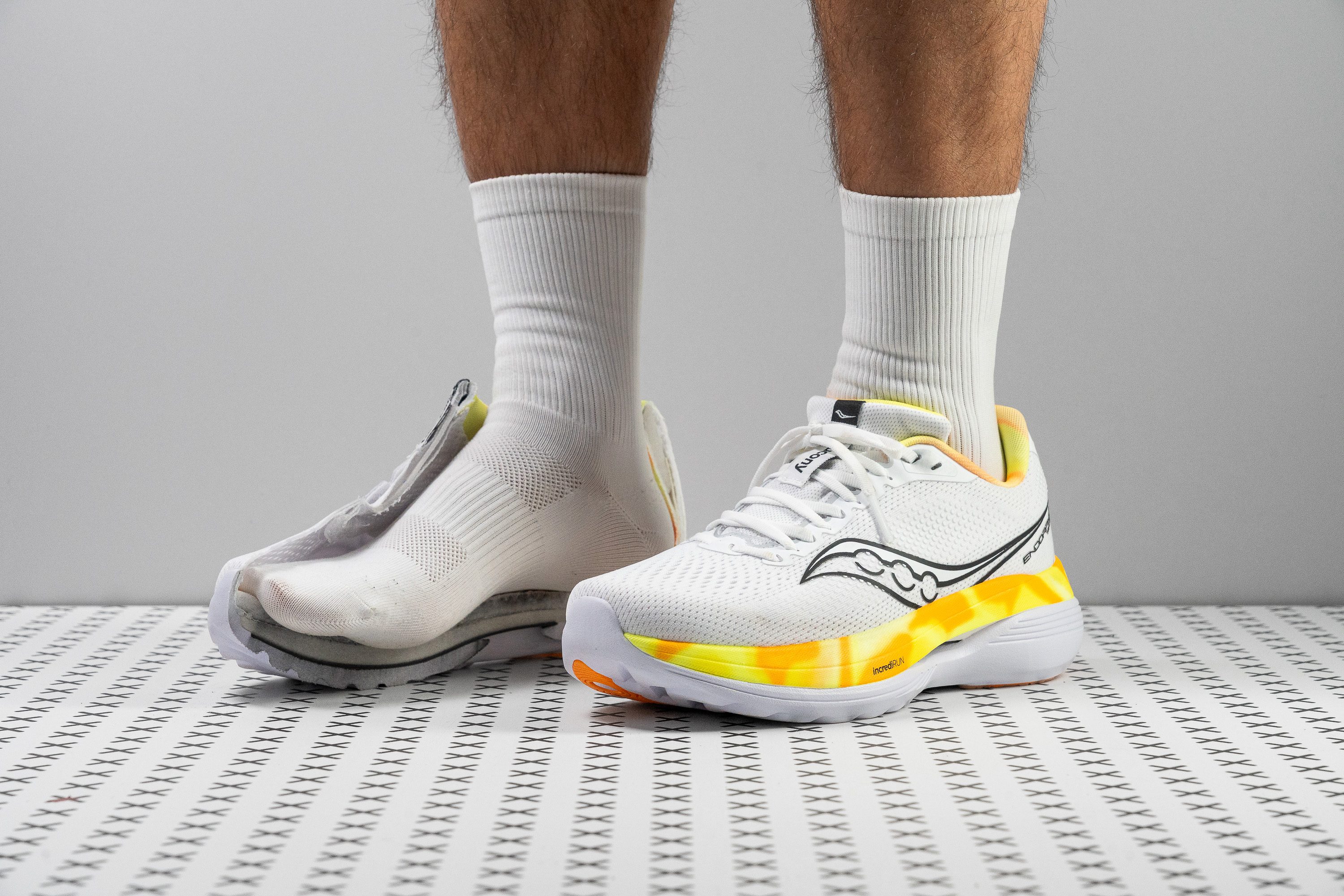Our verdict
Pros
- Ultra-bouncy incrediRUN foam
- Ideal for slow long runs
- PWRRUN+ insole adds comfort
- Wide, stable midsole
- Snappy for forefoot and midfoot strikers
- Much better than the Kinvara Pro
- Comfortable, breathable upper
- Amazing lockdown
Cons
- Narrow toebox
- Heavier than key rivals
- Low rubber coverage
- Low rubber coverage
Audience verdict
Comparison
The most similar running shoes compared
+ + Add a shoe | |||||
|---|---|---|---|---|---|
| Audience score | 79 Good! | 85 Good! | 91 Superb! | 90 Superb! | |
| Price | £200 | £230 | £165 | £170 | |
| Pace | Daily runningTempo | Tempo | CompetitionTempo | CompetitionTempo | |
| Shock absorption | High | High | High | High | |
| Energy return | High | High | Moderate | Moderate | |
| Traction | High | High | Moderate | High | |
| Arch support | Neutral | Neutral | Neutral | Neutral | |
| Weight lab Weight brand | 10.1 oz / 285g 10.1 oz / 286g | 9.8 oz / 278g 9.8 oz / 278g | 8.7 oz / 248g 8.6 oz / 244g | 7.1 oz / 201g 6.9 oz / 196g | |
| Lightweight | ✗ | ✗ | ✓ | ✓ | |
| Drop lab Drop brand | 6.9 mm 8.0 mm | 7.3 mm 6.0 mm | 9.6 mm 8.0 mm | 8.7 mm 7.0 mm | |
| Strike pattern | Mid/forefoot | Mid/forefoot | HeelMid/forefoot | HeelMid/forefoot | |
| Size | True to size | Slightly small | True to size | - | |
| Midsole softness | Soft | Soft | Soft | Soft | |
| Difference in midsole softness in cold | Small | Normal | Small | Small | |
| Toebox durability | Decent | Bad | Good | Bad | |
| Heel padding durability | Decent | Good | Good | Good | |
| Outsole durability | Good | Decent | Good | Good | |
| Breathability | Breathable | Moderate | Moderate | Breathable | |
| Width / fit | Narrow | Medium | Narrow | Medium | |
| Toebox width | Narrow | Medium | Medium | Medium | |
| Stiffness | Stiff | Stiff | Stiff | Moderate | |
| Torsional rigidity | Stiff | Stiff | Stiff | Stiff | |
| Heel counter stiffness | Flexible | Moderate | Stiff | Moderate | |
| Plate | Carbon plate | Carbon plate | Carbon plate | Carbon plate | |
| Rocker | ✓ | ✓ | ✓ | ✓ | |
| Heel lab Heel brand | 38.9 mm 42.0 mm | 36.8 mm 41.0 mm | 39.7 mm 40.0 mm | 35.3 mm 37.5 mm | |
| Forefoot lab Forefoot brand | 32.0 mm 34.0 mm | 29.5 mm 35.0 mm | 30.1 mm 32.0 mm | 26.6 mm 30.5 mm | |
| Widths available | Normal | NormalWide | Normal | Normal | |
| Orthotic friendly | ✓ | ✓ | ✓ | ✓ | |
| Season | SummerAll seasons | All seasons | All seasons | SummerAll seasons | |
| Removable insole | ✓ | ✓ | ✓ | ✓ | |
| Ranking | #337 Bottom 12% | #203 Bottom 46% | #20 Top 6% | #54 Top 15% | |
| Popularity | #148 Top 39% | #34 Top 9% | #27 Top 8% | #118 Top 31% |
Who should buy
We believe that the Endorphin Trainer can serve well to:
- Runners who disliked the Saucony Kinvara Pro’s lack of responsiveness.
- Forefoot or midfoot strikers needing a long-run shoe packed with a carbon plate and cutting-edge foam at a reasonable price.
- Saucony fans of the Endorphin line wanting a premium complement to their Endorphin Pro 4 or Endorphin Speed 4 for handling slow runs.
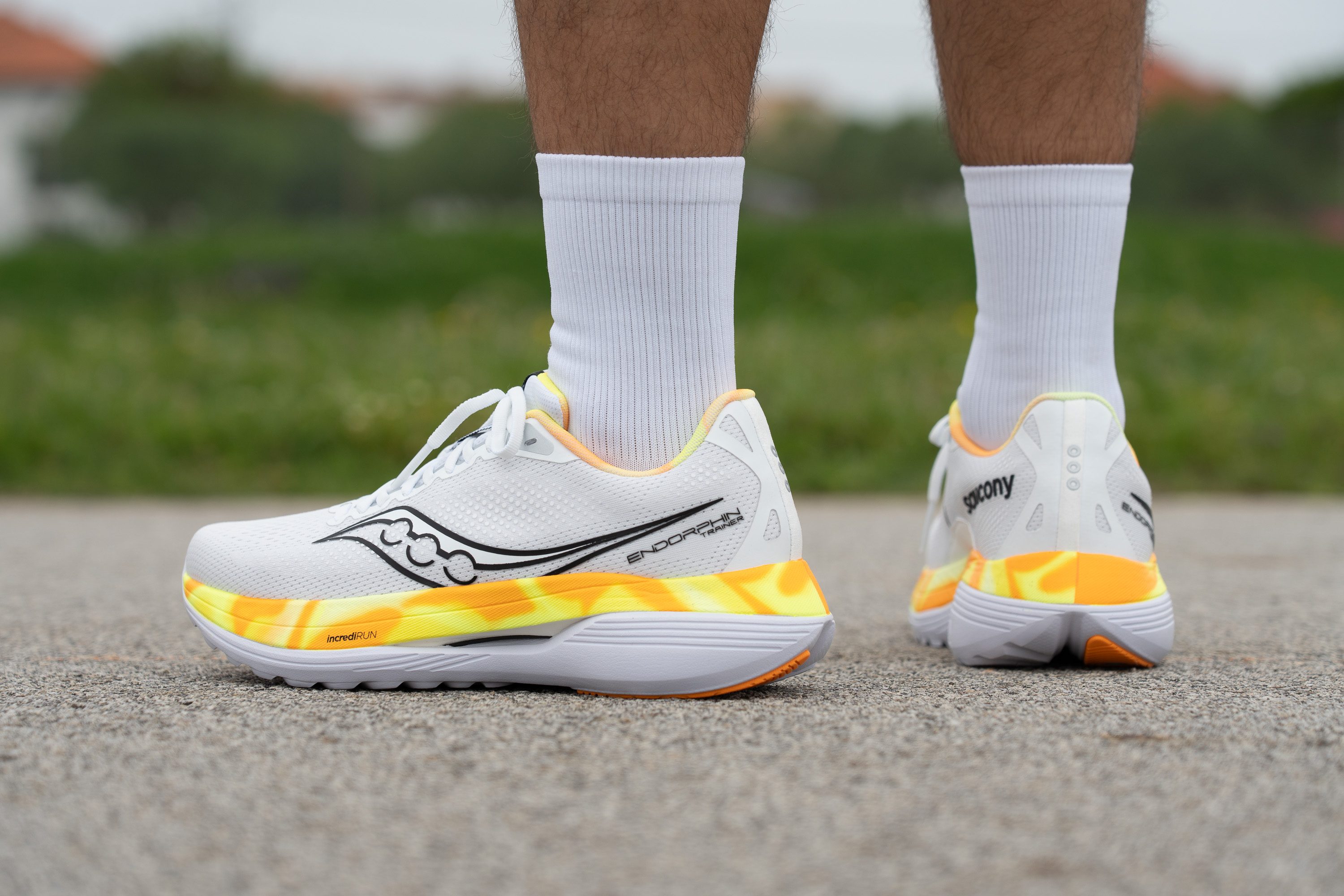
Who should NOT buy
We believe that the Endorphin Trainer struggles a bit as a tempo shoe. Its ultra-firm PWRRUN layer that goes below the plate delivers low energy return and adds too much weight. We definitely think that the Nike Zoom Fly 6 or ASICS Superblast 2 offer a better running experience at faster paces.
Additionally, from our perspective, the narrow, snug-toe fit leaves little room for comfort during long runs for most runners. We think that anyone needing a more accommodating toebox will find the Adidas Adizero EVO SL or New Balance FuelCell SuperComp Trainer v3 to be superior alternatives.
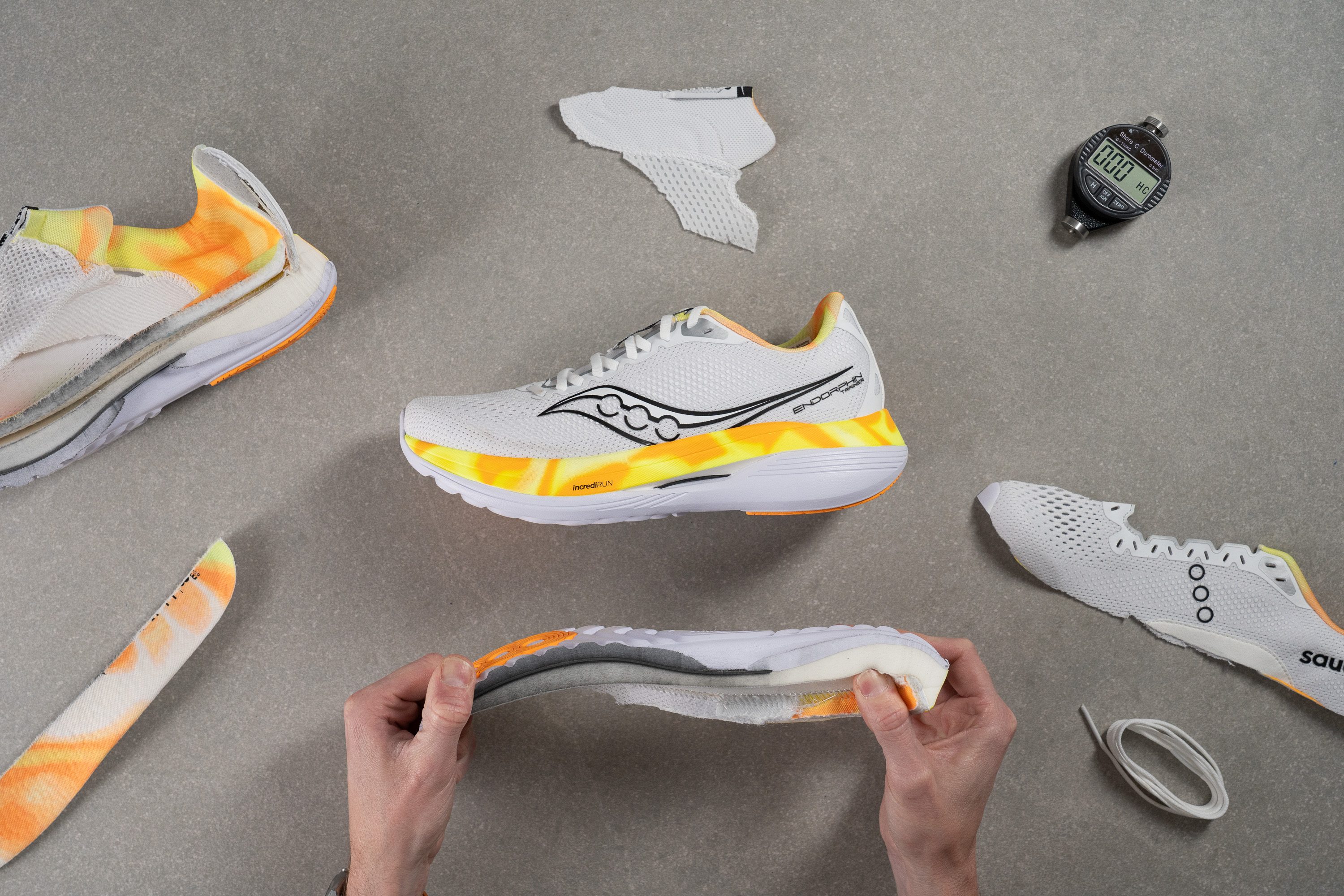
Cushioning
Shock absorption
Worried about shock absorption? You won’t be with the Endorphin Trainer. It delivers 138 SA in the heel and 112 SA in the forefoot, both premium-grade numbers for joint protection. That makes it an ideal long run companion for fans of Saucony super shoes.
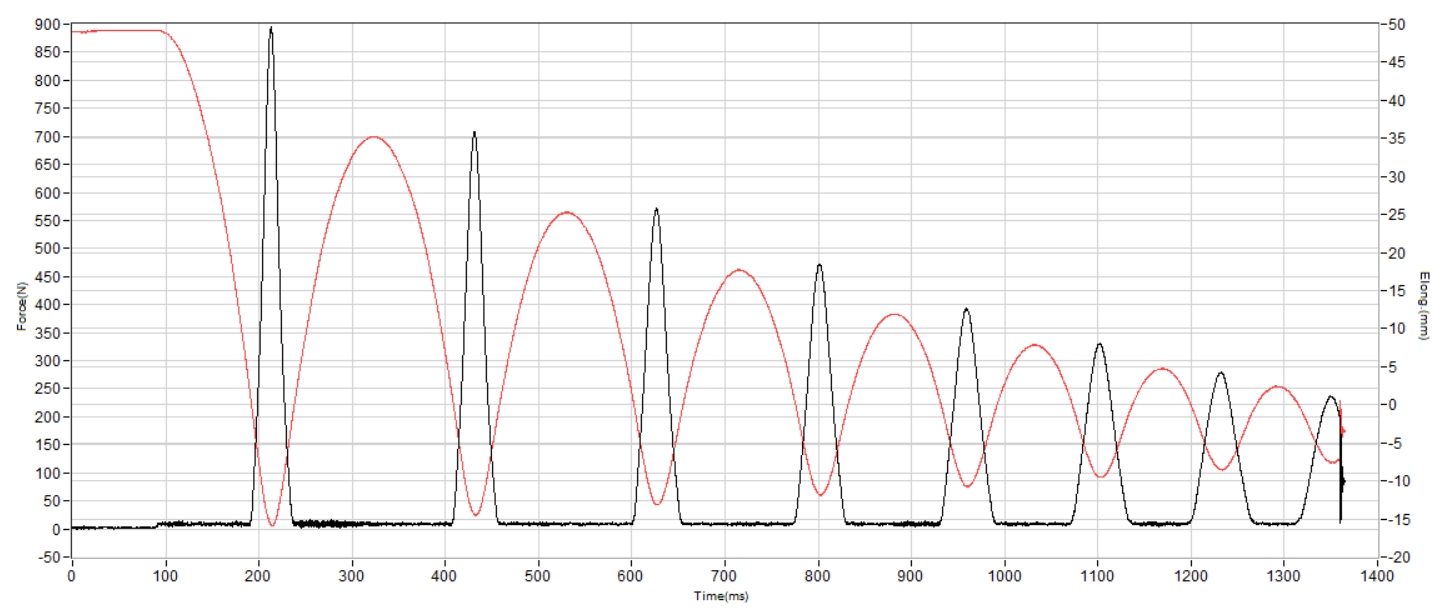
| Endorphin Trainer | 138 SA |
| Average | 130 SA |
Energy return
One of the strongest qualities of the Endorphin Trainer is its impressive energy return. It delivers 68.8% in the heel and a glorious 76.3% in the forefoot. But why the difference between the two?
It all comes down to Saucony’s new IncrediRUN foam. This ultra-responsive material is more concentrated in the forefoot, which is why energy return there rivals the best super shoes on the market.
| Endorphin Trainer | 68.8% |
| Average | 58.6% |
Heel stack
The Endorphin Trainer hit the market as quick as possible to replace the underwhelming Kinvara Pro, and despite its slightly lower stack height, we feel it’s far more of a genuine super trainer.
Some claim that for a shoe to qualify as a super trainer, it must exceed 40 mm of stack height—but we think that’s becoming an arbitrary benchmark mainly tied to World Athletics’ racing limits.
In reality, the difference between 38.9 mm and, say, 40.3 mm is almost impossible to feel. We believe that a true super trainer is more about being a performance-focused trainer packed with a high-rebound foam.
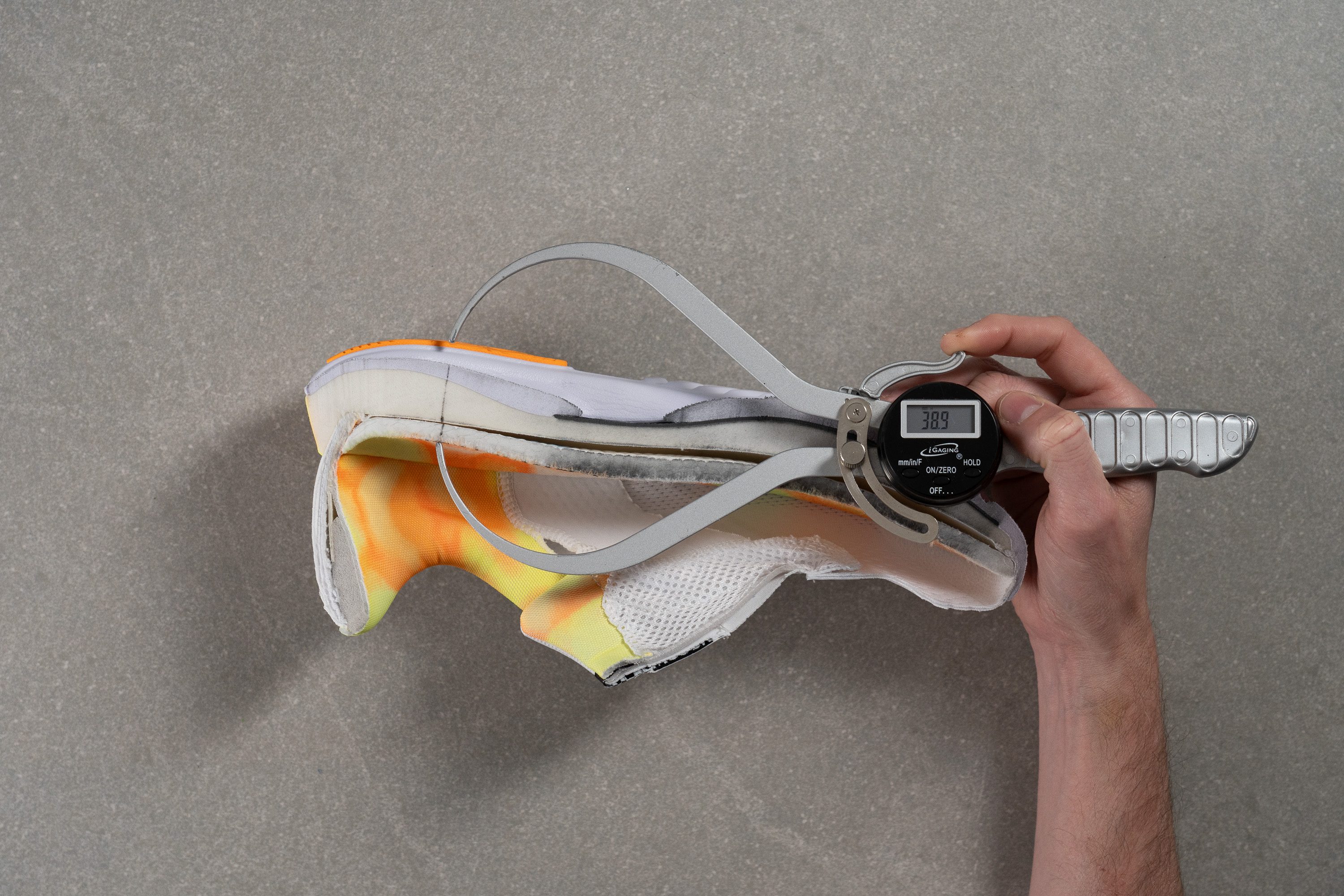
| Endorphin Trainer | 38.9 mm |
| Average | 34.8 mm |
Forefoot stack
The forefoot also packs top-tier cushioning at 32.0 mm, making the Endorphin Trainer a super-solid choice for long runs.
With its new naming, it's clear that Saucony positions this shoe as the training companion to the Endorphin series, offering extra durability while keeping an ultra-responsive feel underfoot.
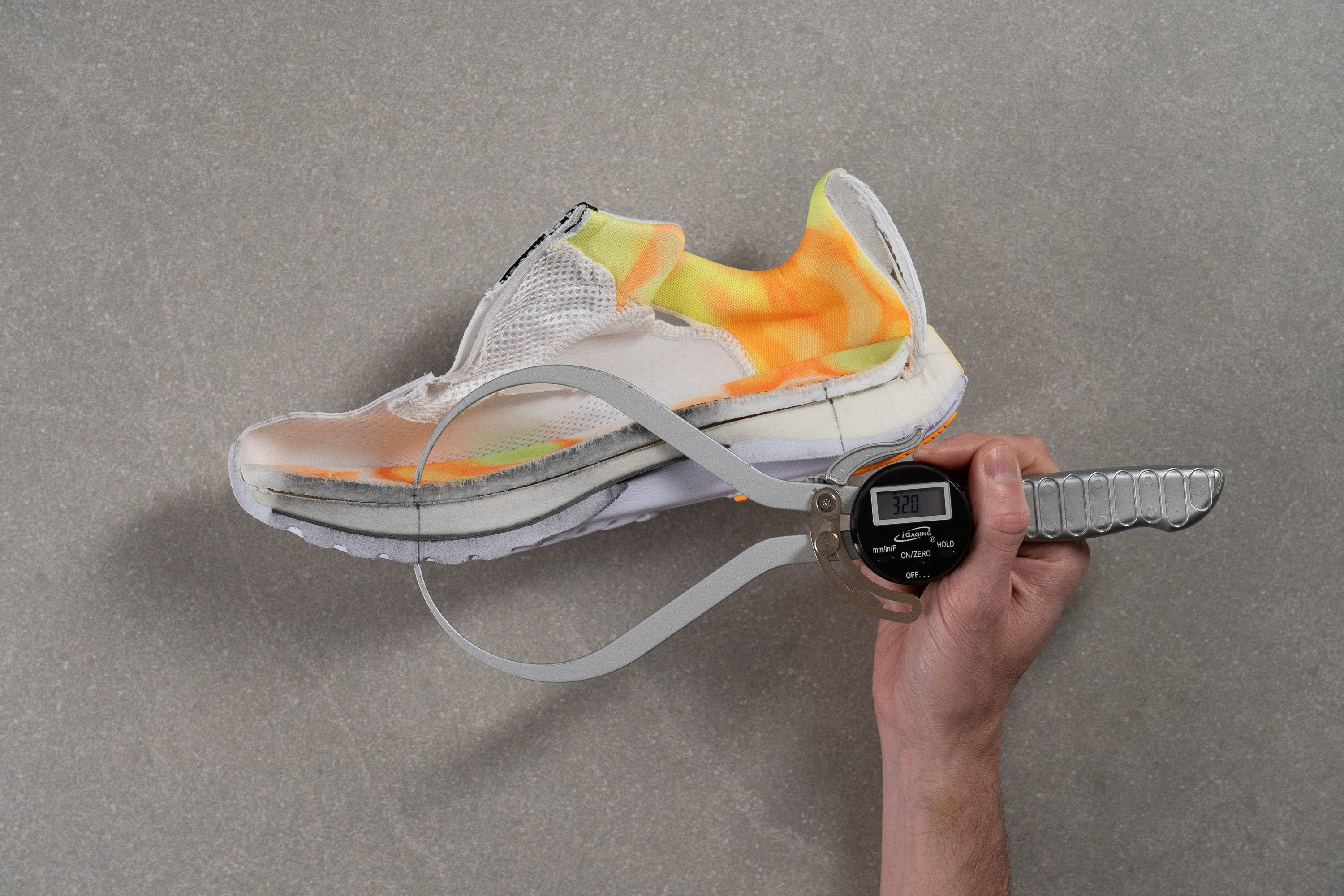
| Endorphin Trainer | 32.0 mm |
| Average | 26.2 mm |
Drop
This shoe is listed with an 8 mm drop, but we measured 6.9 mm—slightly less, though it feels the same underfoot. It offers a solid geometry that works smoothly for all footstrikes, yet we believe it’s best for midfoot strikers.
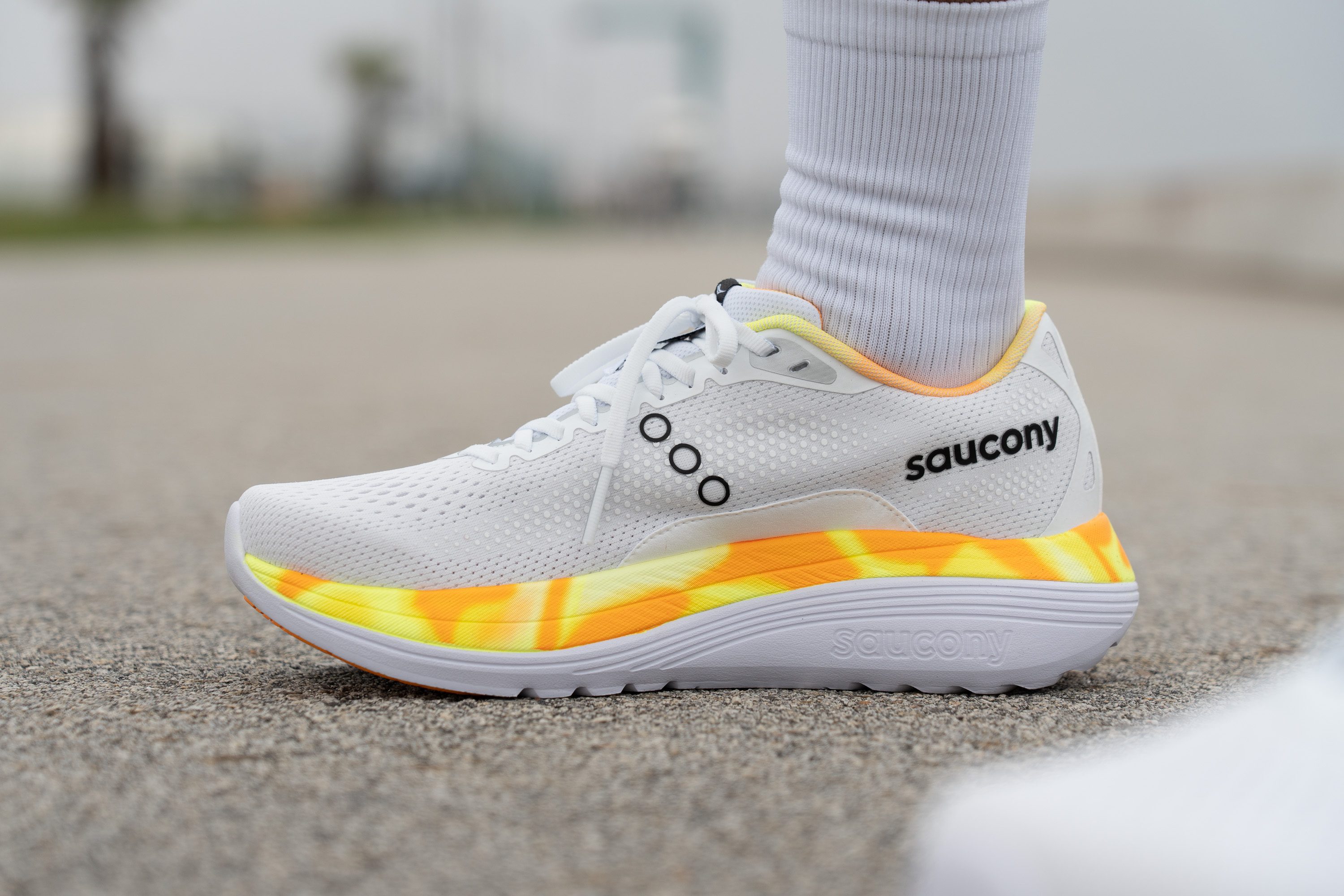
| Endorphin Trainer | 6.9 mm |
| Average | 8.6 mm |
Midsole softness
UpdatedNow we’re getting to the most fascinating part of the Endorphin Trainer. While the Kinvara Pro really underwhelmed with its energy return, Saucony aimed to flip the script here.
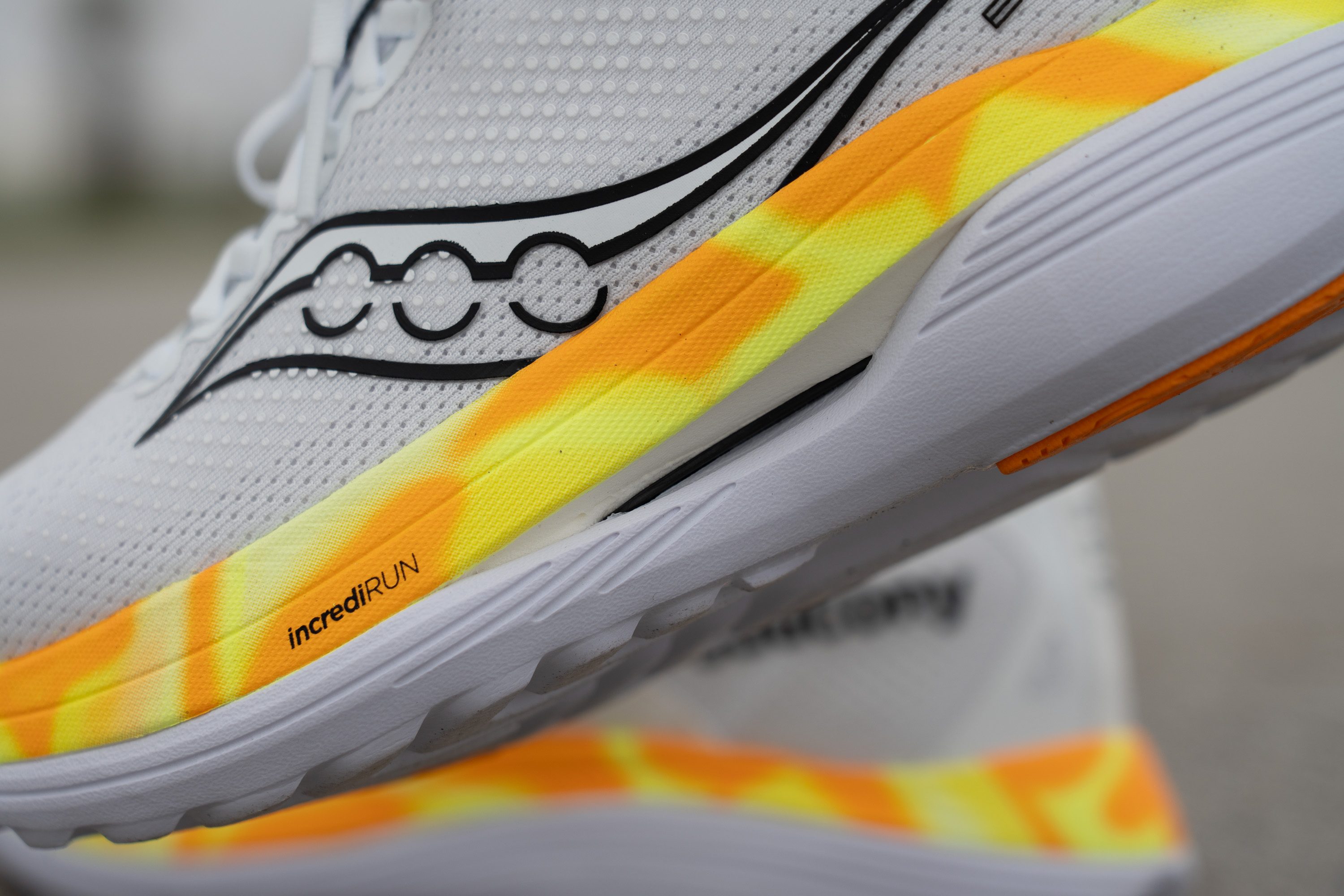
Like many super trainers, this shoe features a dual-foam setup, with the premium one closer to the foot. We tested the incrediRUN foam and it shattered our lab record with an ultra-low score of 19.6 AC.
During our runs, it felt remarkably different from anything else and bounced back with crazy energy!
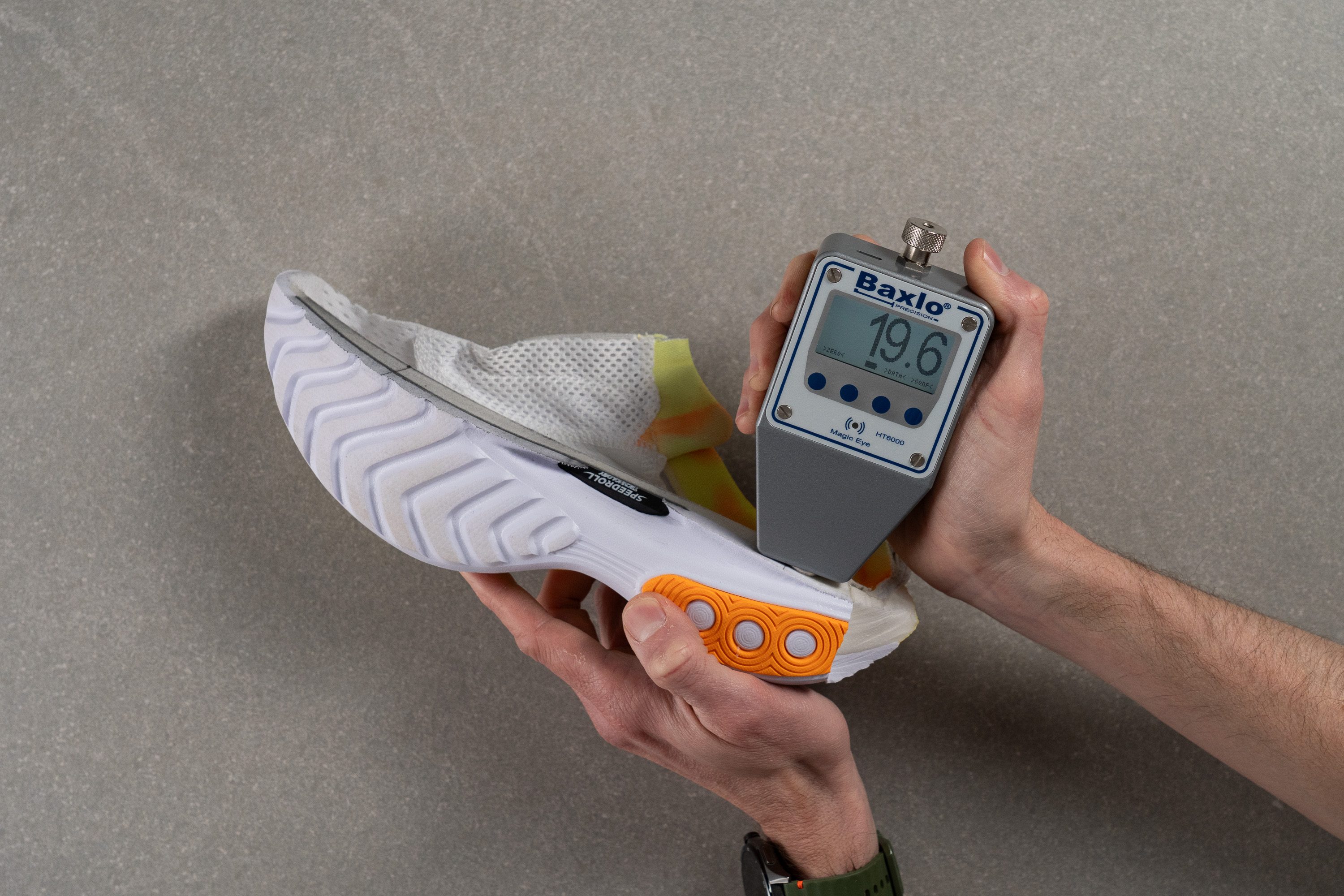
| Endorphin Trainer | 19.6 AC |
| Average | 36.3 AC |
Secondary foam
UpdatedHowever, the Endorphin Trainer doesn’t feel that soft when hitting the ground, and there’s a good reason. While most brands blend two foams with similar densities, Saucony went bold and mixed the softest foam we’ve ever tested in the lab with... one of the firmest!
That’s why, in our video, the shoe looks firm—pressing on the secondary layer shows almost no deformation. But underfoot, we experienced a different feel due to the much softer incrediRUN layer. We believe this setup won’t suit everyone, but it’s undeniably unique.
We found that the secondary layer hit 55.7 AC on our durometer, so we confirmed it's firm as concrete. And it's made from PWRRUN, so isn’t new for Saucony fans, but they modified the EVA foam to be ultra-dense here. In our view, maybe too much...
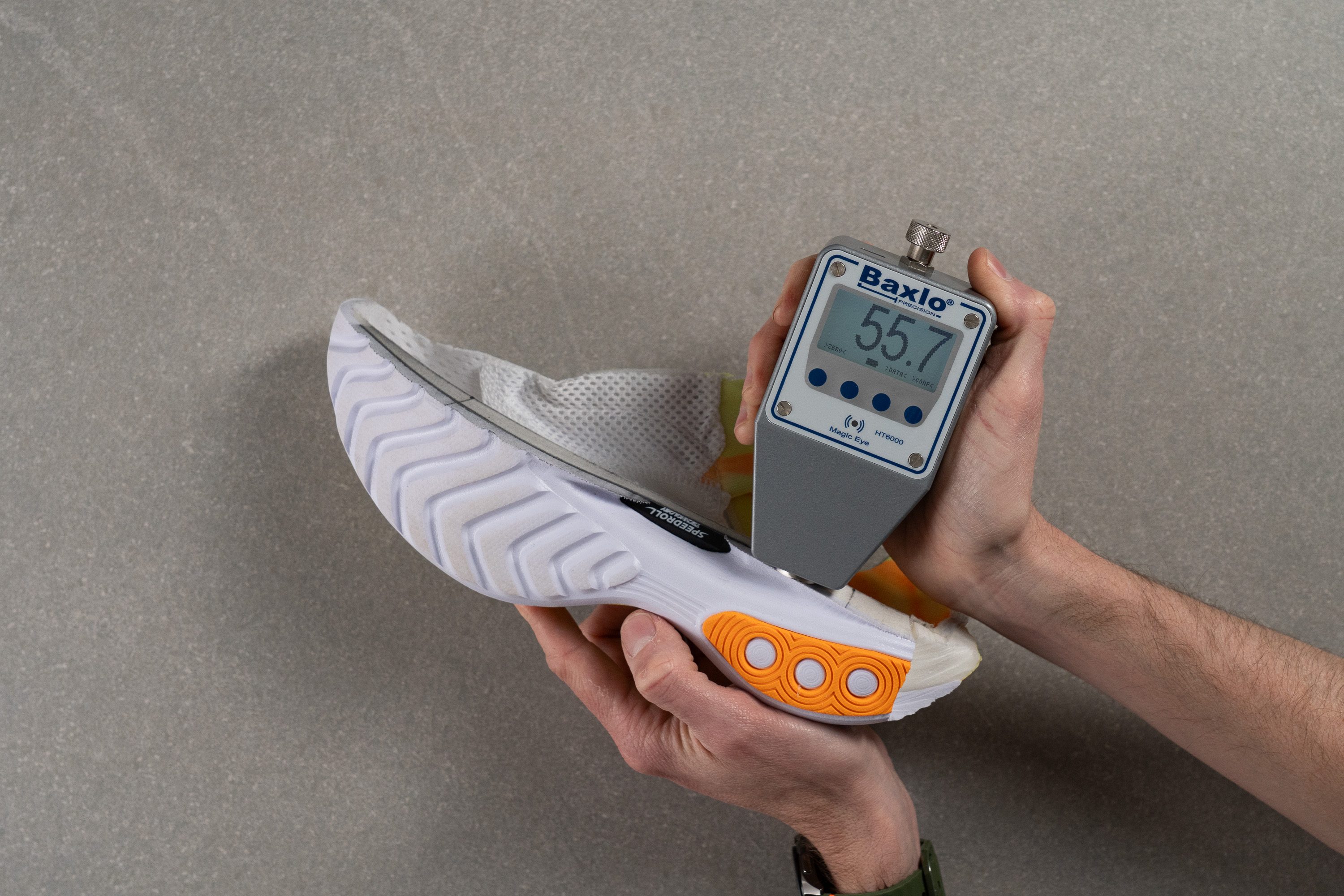
| Endorphin Trainer | 55.7 AC |
| Average | 39.1 AC |
Rocker
Those who love a late-stage rocker—meaning it doesn’t kick in early—will instantly appreciate the Endorphin Trainer, as we discovered it’s one of the most less curved midfoot designs among the super trainers we tested.
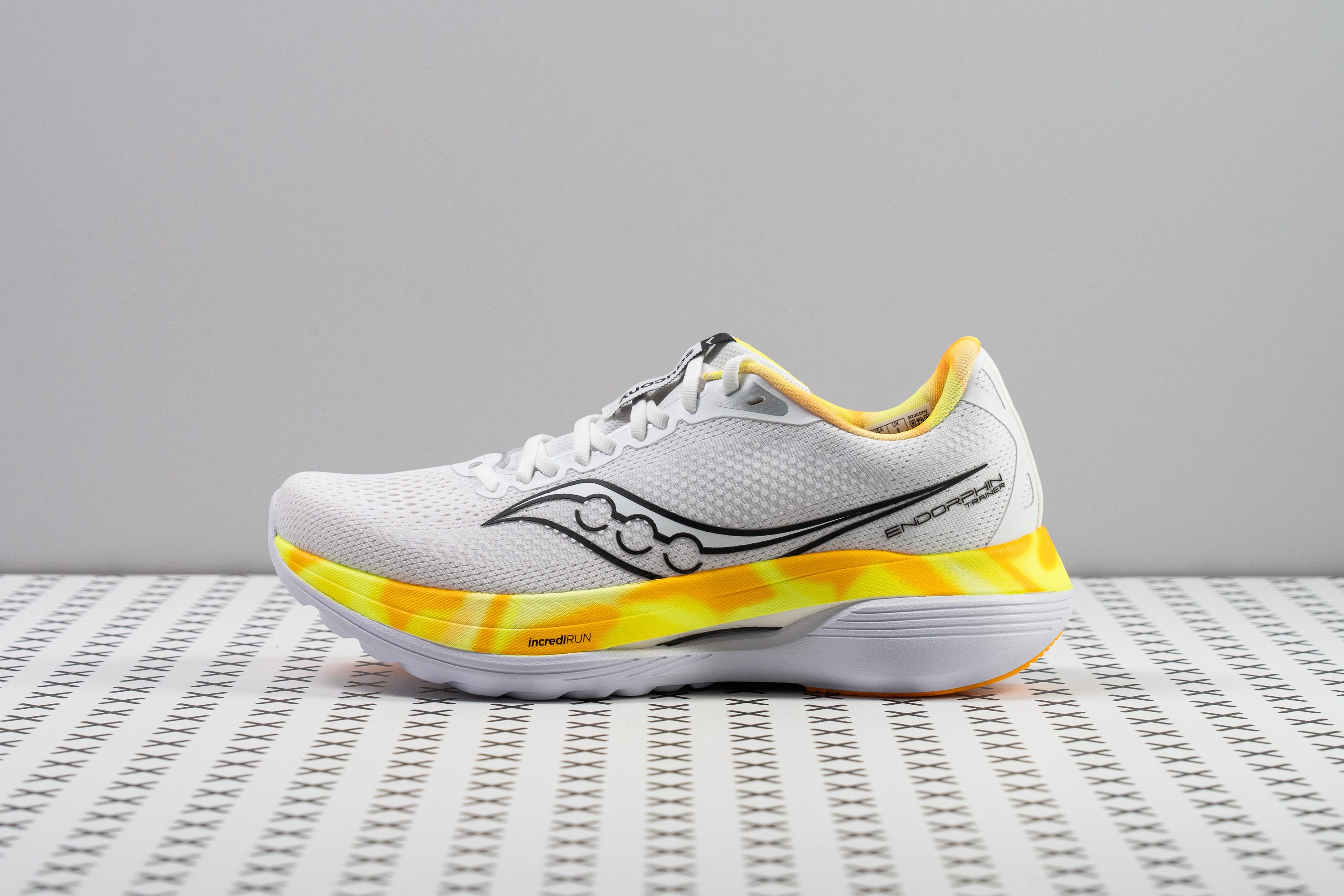
This setup favours runners who dislike an overly-intrusive feel yet crave a highly-energised, snappy toe-off. And, as we said before, we think it's better suited for those who strike the ground with the midfoot or forefoot.
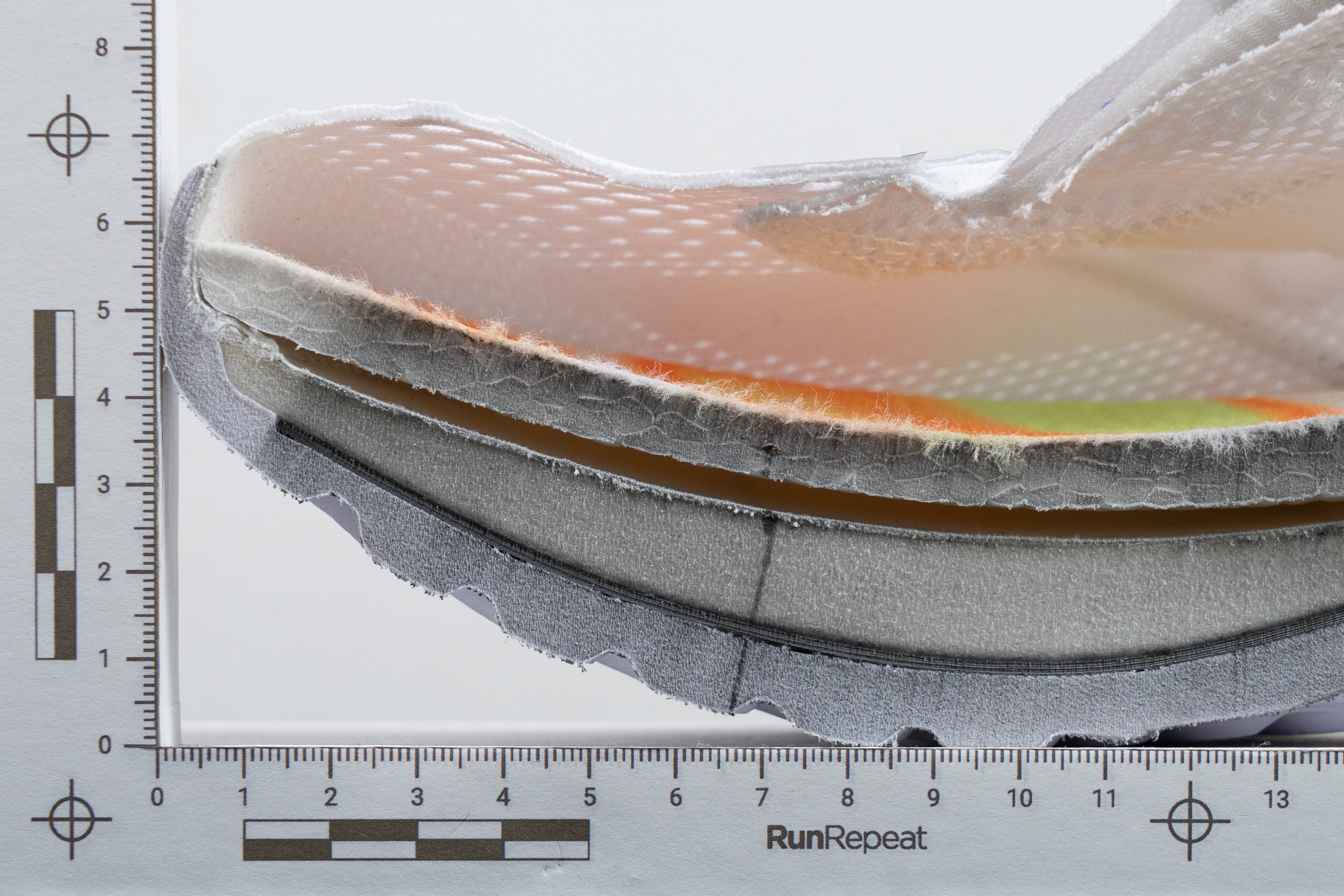
Plate
The Endorphin Trainer features a carbon plate, but we discovered it’s a different-than-usual design—covering only 3/4 of the shoe and leaving the heel unplated for softer landings. And despite being a partial-length plate, Saucony considers it part of the Speedroll Technology series.
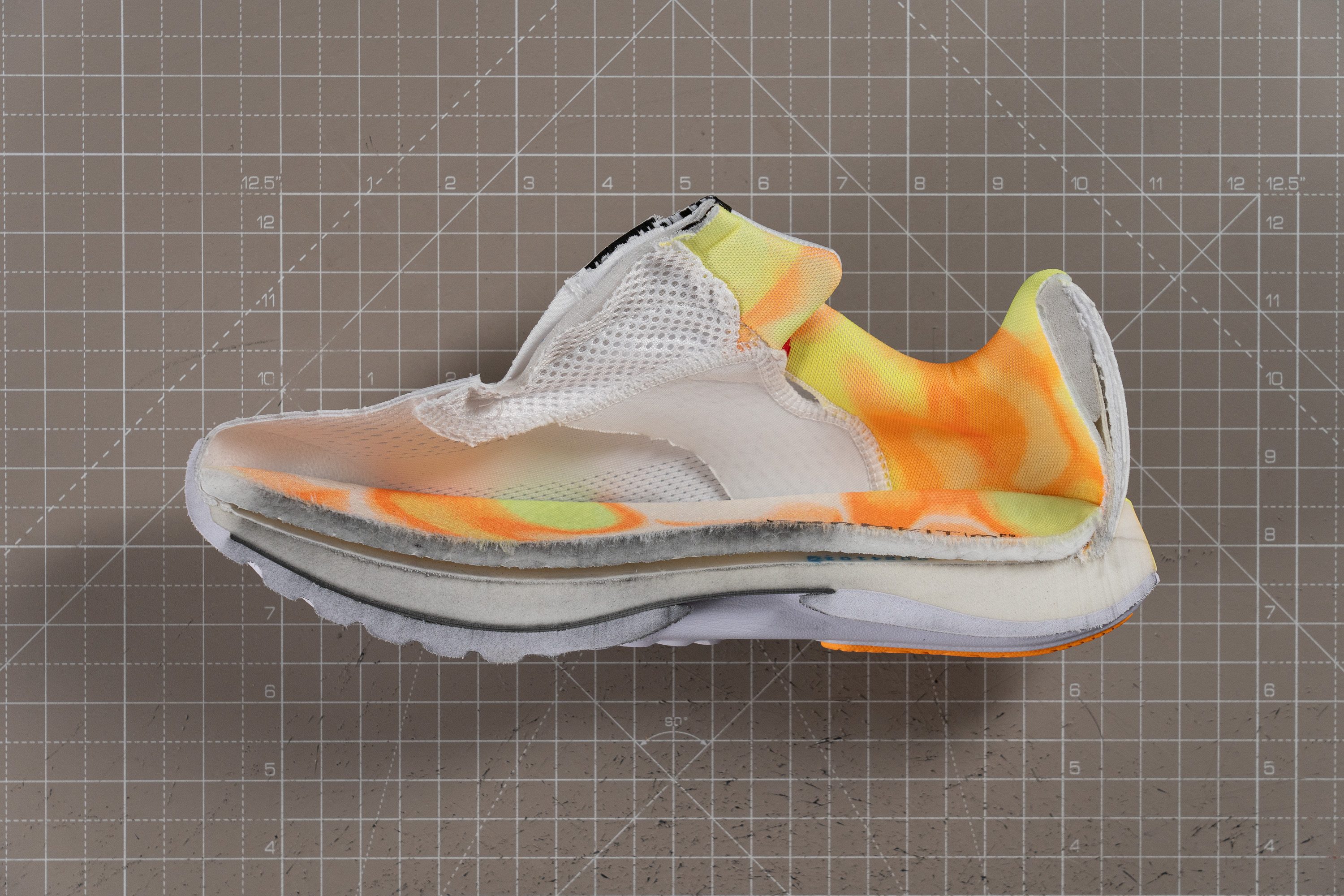
Size and fit
Size
Saucony Endorphin Trainer fits true to size (13 votes).
Width / Fit
The Endorphin Trainer midsole feels highly polarising, and we found that the fit also represents that bold character. Before taking measurements, we simply tried the shoes on to gain a first impression, instantly realising this wasn’t going to suit every foot.
Still, we know numbers beat feelings, so we went ahead and measured. We crafted a 1:1 gel mould of the shoe's interiors using our ultra-precise method and discovered that at 92.3 mm, the widest part of the upper is definitely narrower than the average running shoe.
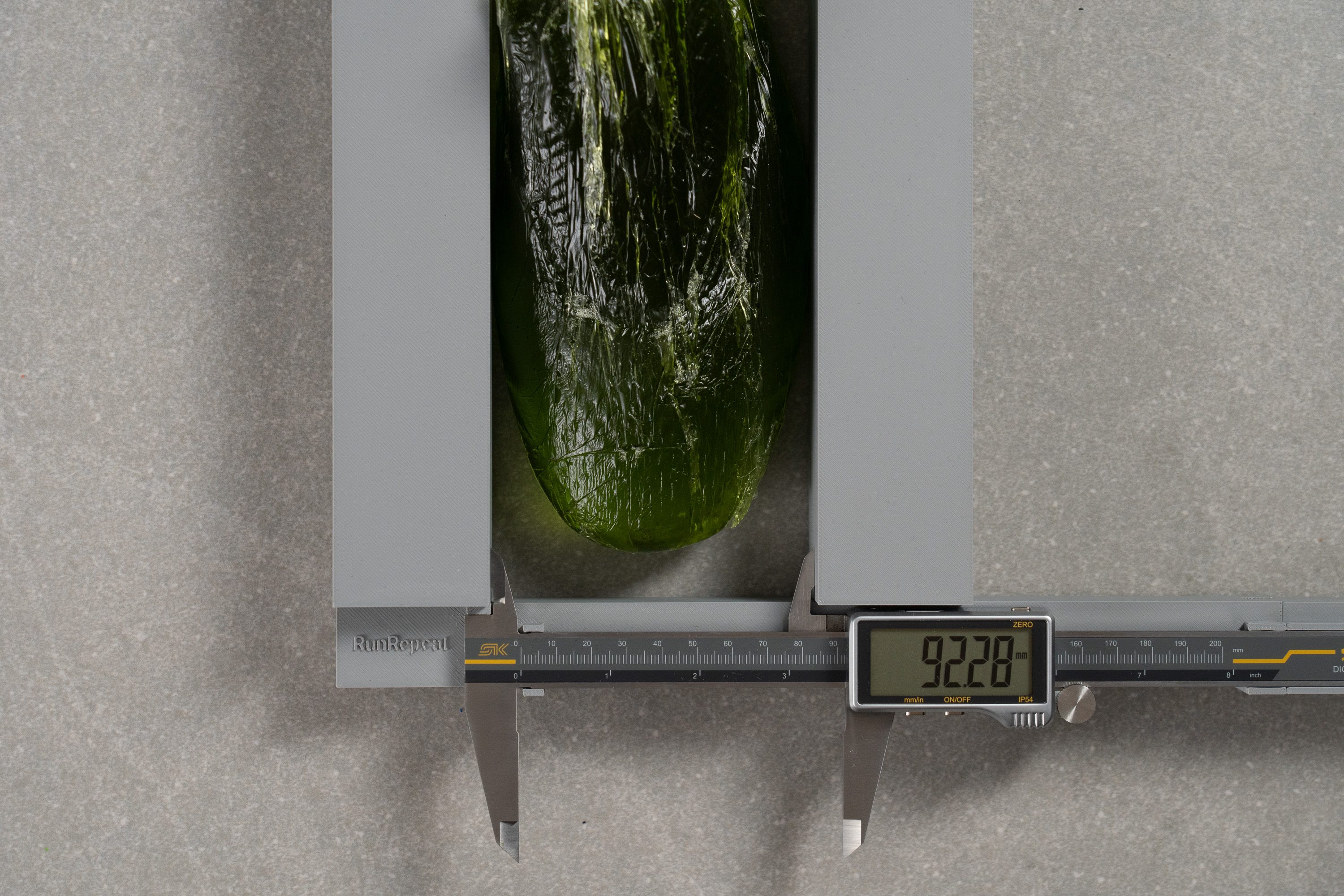
| Endorphin Trainer | 92.3 mm |
| Average | 95.1 mm |
Toebox width
And for those with wide feet, things get even trickier as we move closer to the tip of the Endorphin Trainer.
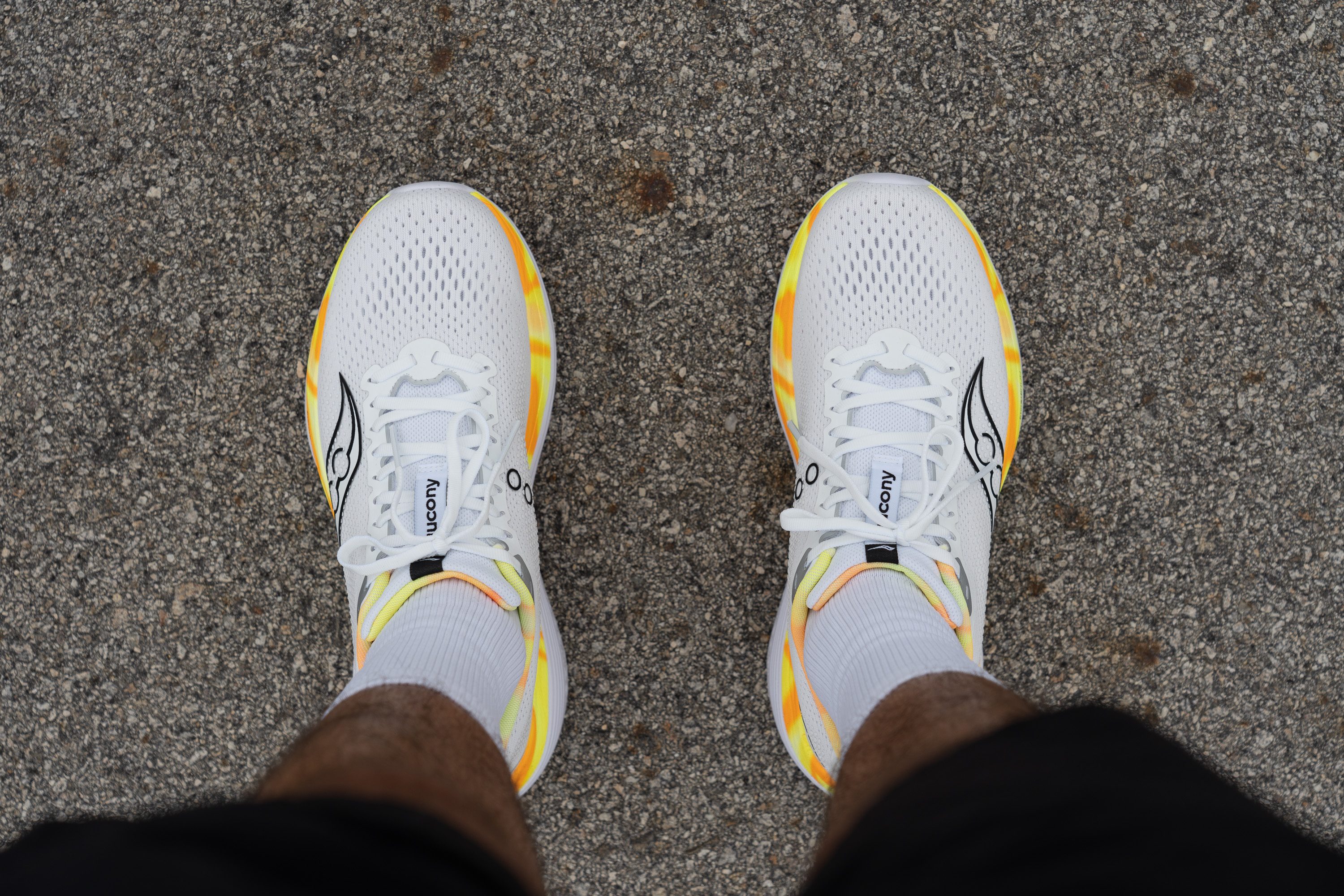
In the big toe area, we measured 70.1 mm, which is undeniably a tapered, race-inspired design choice by Saucony.
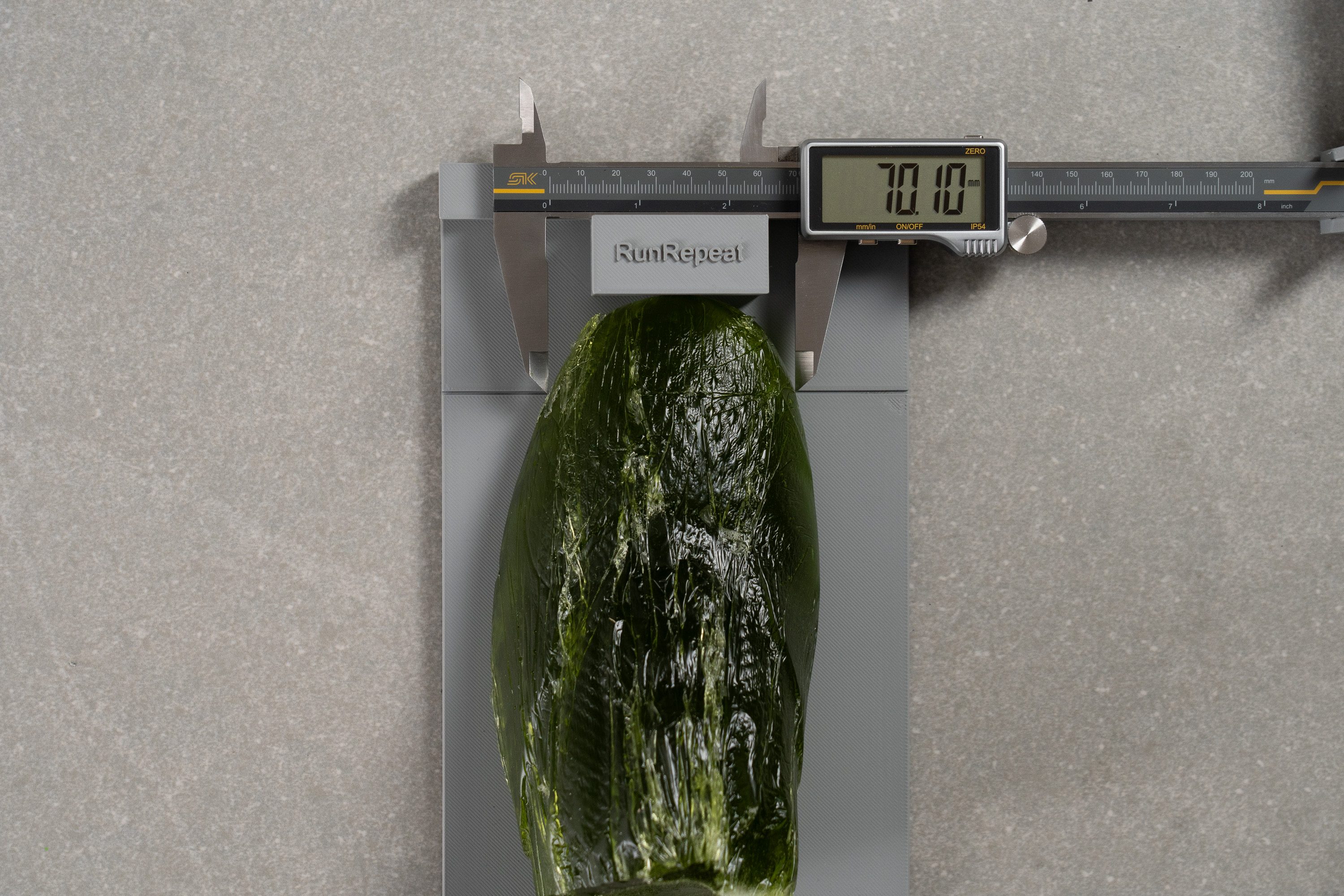
| Endorphin Trainer | 70.1 mm |
| Average | 73.3 mm |
Toebox height
On the other hand, we were surprised by the impressively high toebox height of the Endorphin Trainer at 28.9 mm.
There’s generous space for upward toe movement, making it a pleasant surprise for runners using this shoe for marathon-prep long runs.
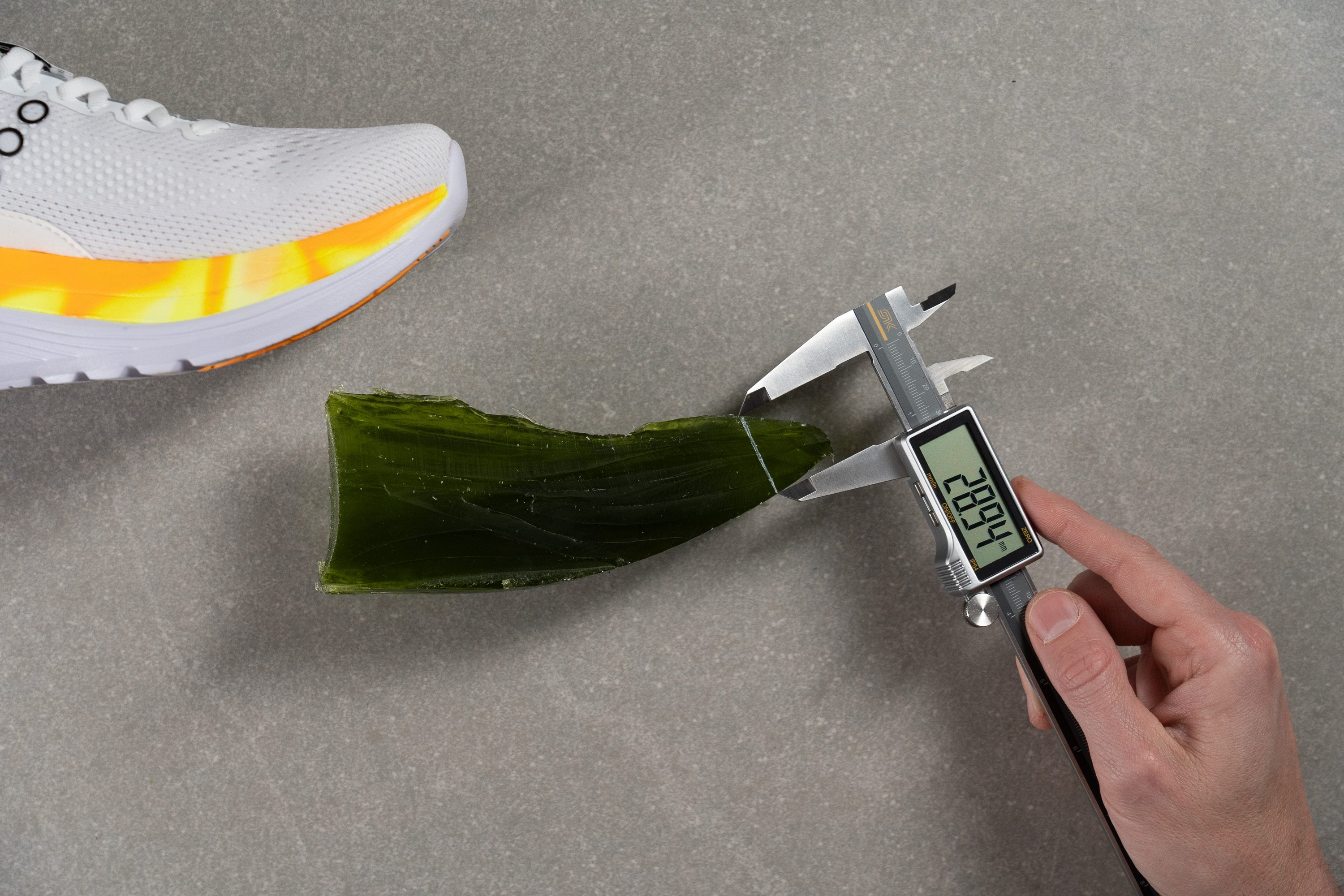
| Endorphin Trainer | 28.9 mm |
| Average | 27.0 mm |
Traction / Grip
Traction test
The outsole won’t hold you back in the Endorphin Trainer—it scored a solid 0.46 in our SATRA TM144 lab test, offering reliable grip for everyday runs whether you're on sun-baked asphalt or rain-slicked roads.
| Endorphin Trainer | 0.46 |
| Average | 0.49 |
Outsole design
We were surprised to find that the Endorphin Trainer features only minimal orange rubber on the outsole, placed solely in the most wear-prone spots, leaving most of the surface exposed to a reinforced PWRRUN layer.
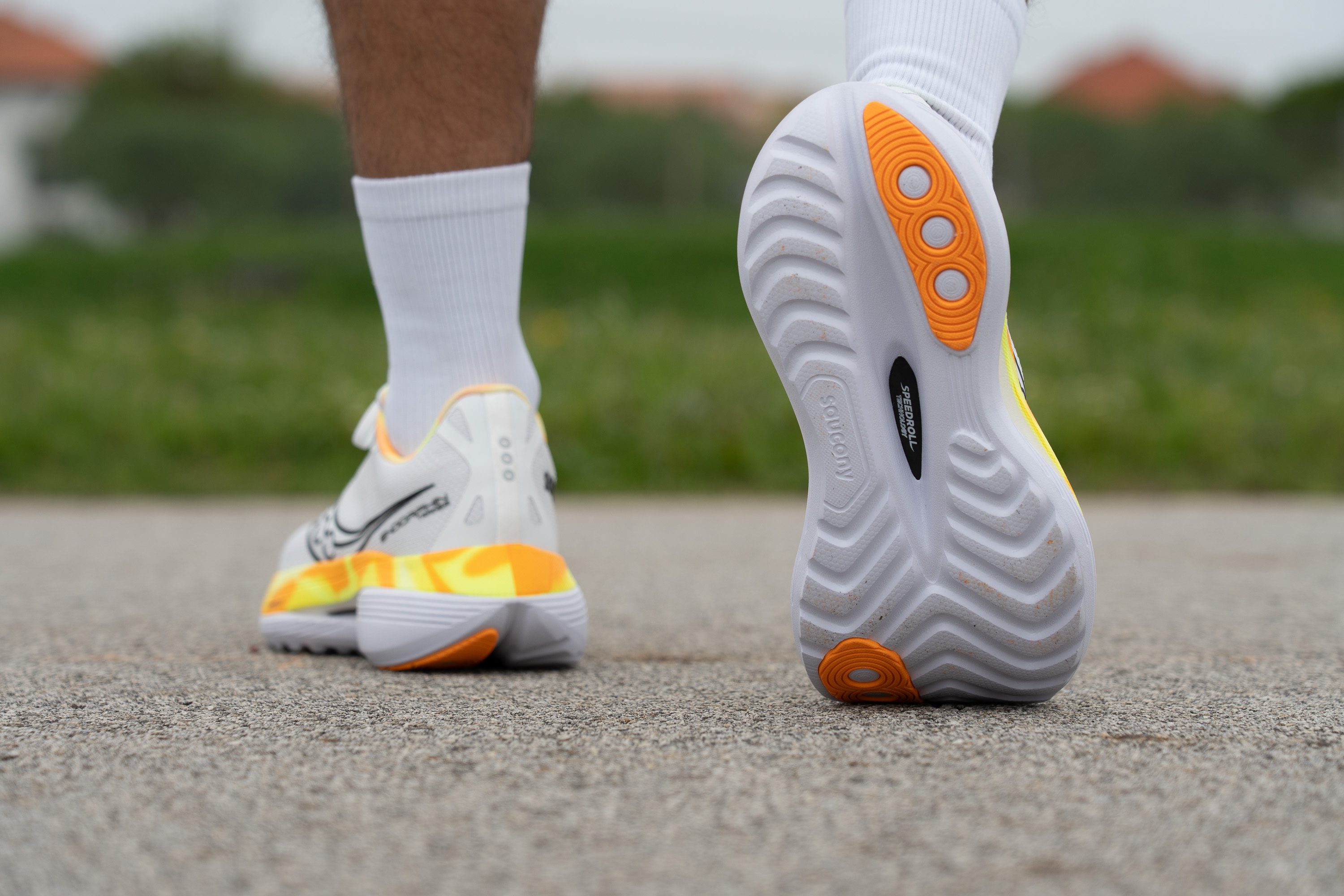
Flexibility / Stiffness
Packing such a thick foam layer and a carbon plate running through the midfoot and forefoot, we knew this shoe wasn’t going to be flexible.
We tested it by bending the shoe 30 degrees with our custom machine, and 25.6N confirms it's stiff as a super shoe.
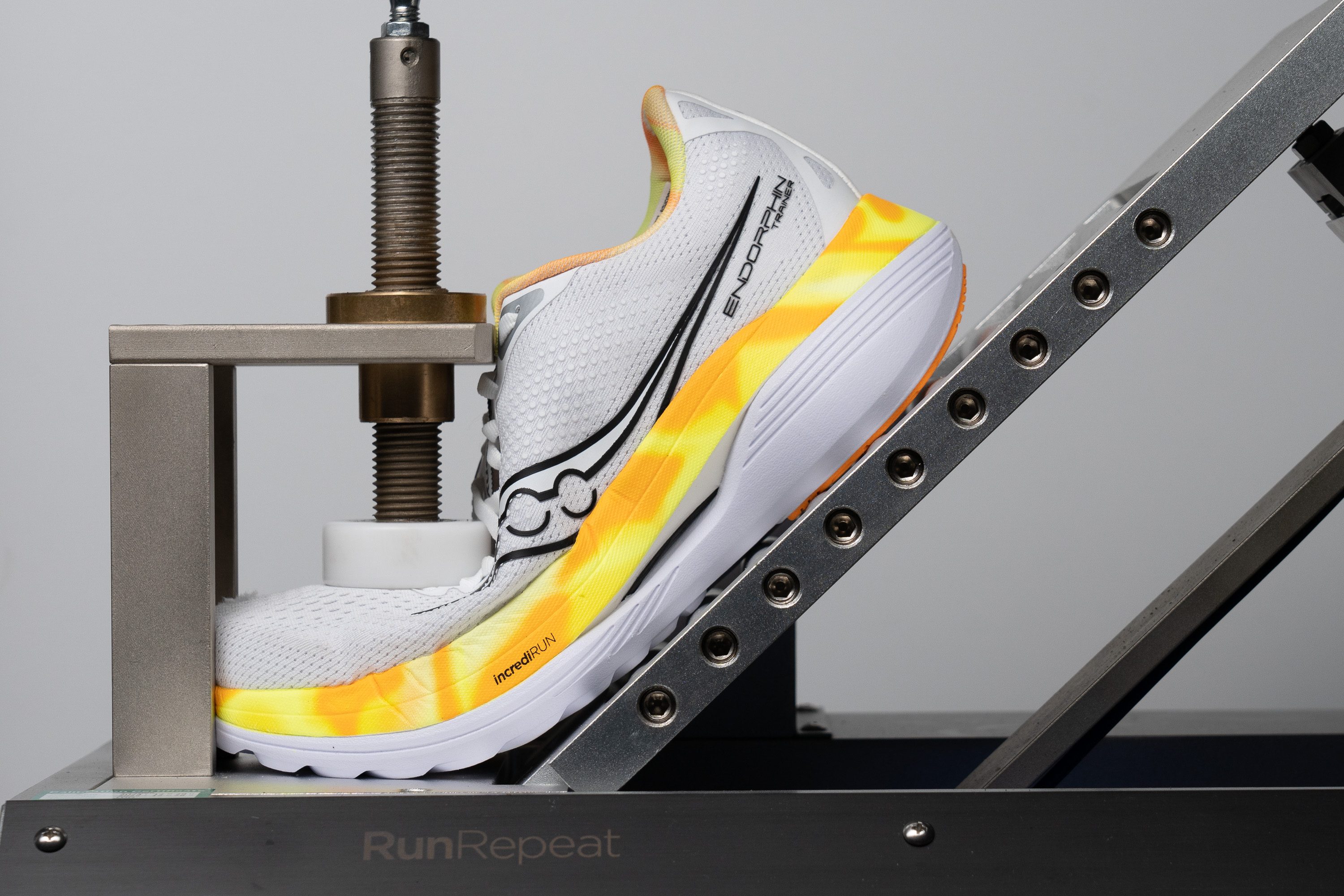
| Endorphin Trainer | 25.6N |
| Average | 15.3N |
Weight
Here in the lab, the Endorphin Trainer kept getting more polarising with every single test—and weight followed the same trend. We discovered that at 10.05 oz or 285g, this is no lightweight super trainer, leaving us underwhelmed.
It may not feel too heavy during slow or steady long runs, but when we tested it at faster paces, the bulky construction became unmistakably noticeable compared to many competitors on the market.
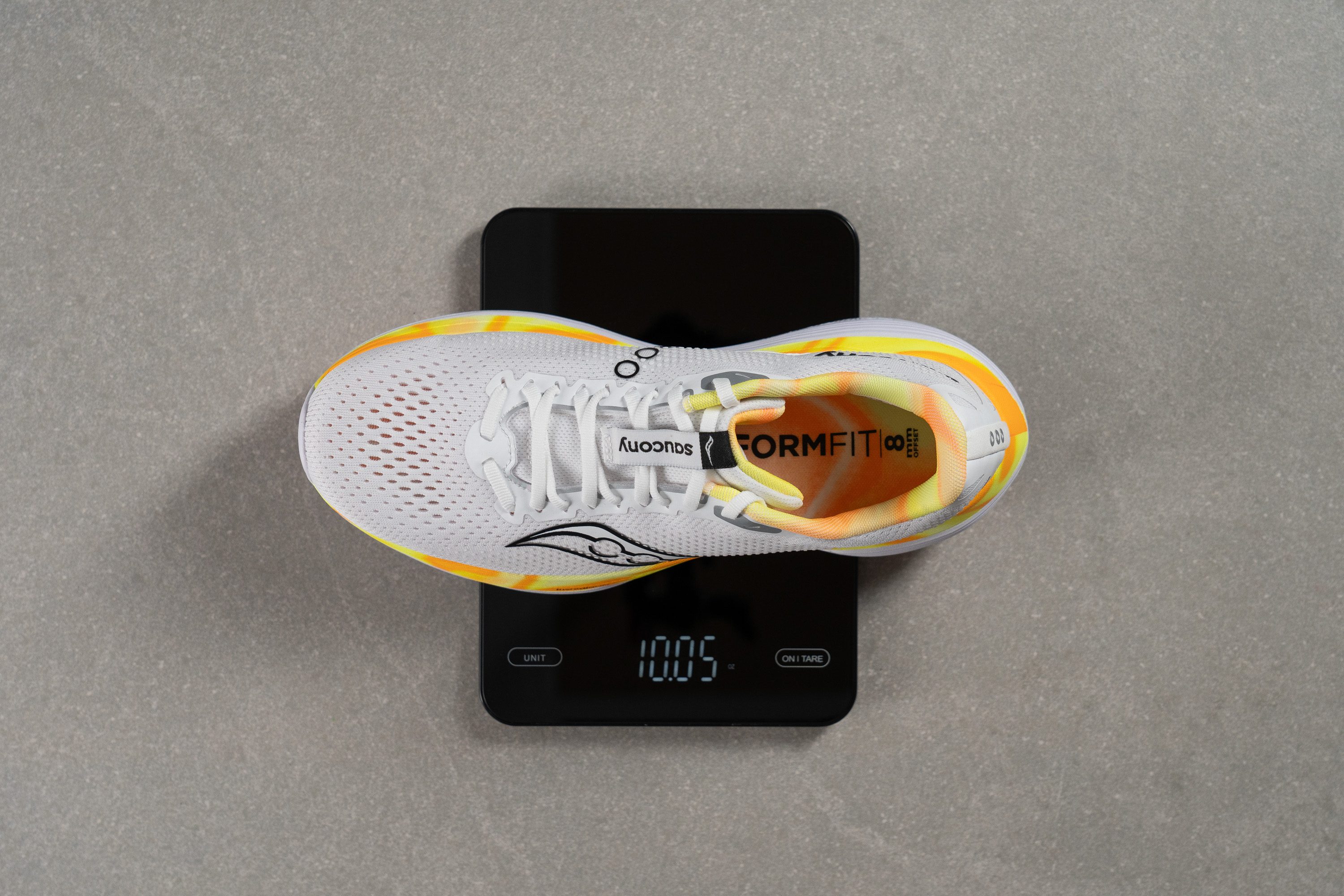
| Endorphin Trainer | 10.1 oz (285g) |
| Average | 9.3 oz (264g) |
Breathability
One of the first things that struck us visually about the Endorphin Trainer was the oversized ventilation holes that clearly signalled sky-high breathability.
To confirm this, we used our smoke machine and discovered that the Endorphin Trainer breathes incredibly well, almost outperforming every other shoe we’ve tested when it comes to battling overheating on hot long runs. It's another 5 out of 5 for this shoe.
We found that the thin mesh material used by Saucony contributes massively to this breathable feel, and when we moved the upper across a bright light, the airy structure became even more obvious to us.
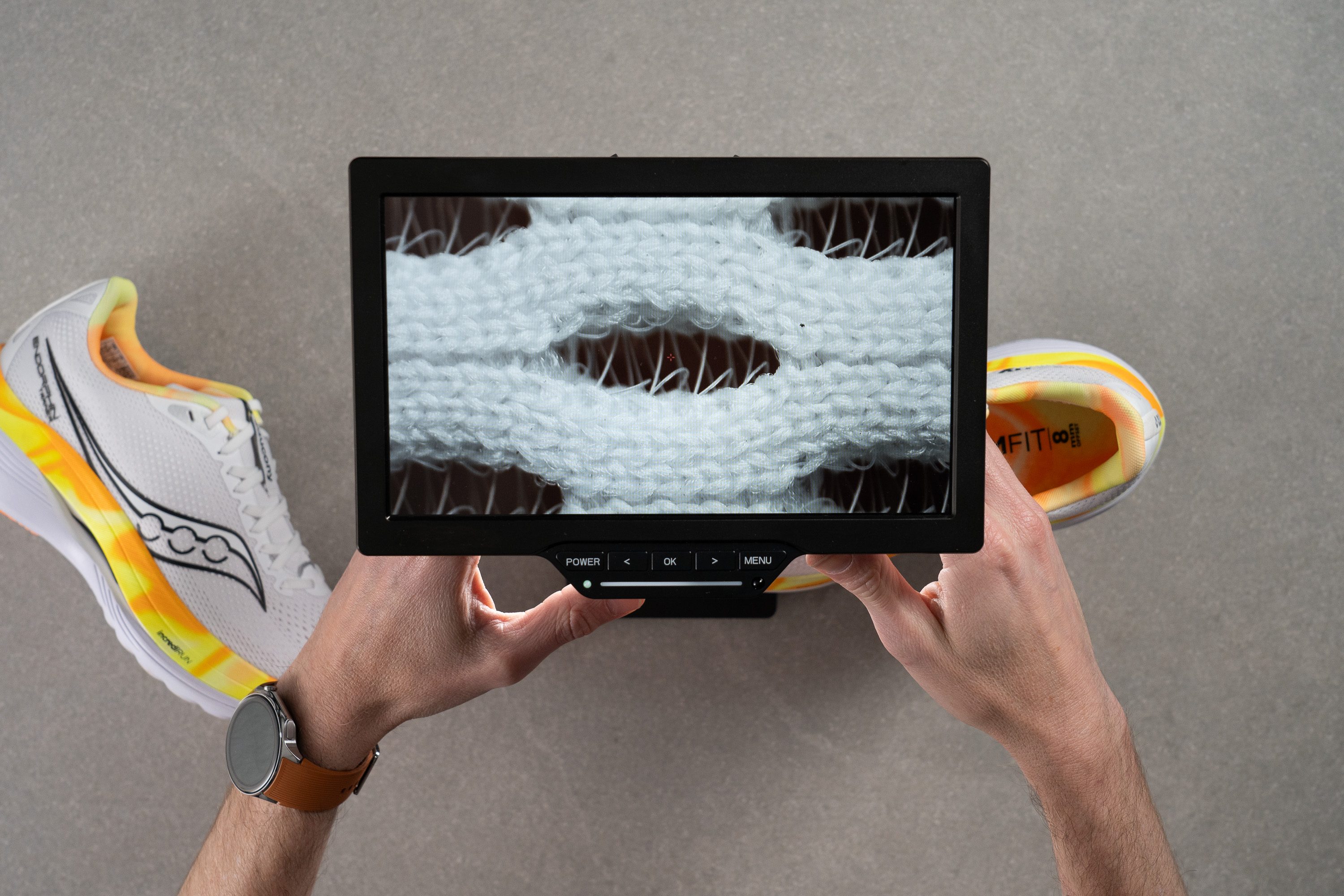
Taking things further, we examined the shoe under our digital microscope, and it became clear that Saucony made a bold choice by skipping the common secondary layer under the mesh—boosting airflow compared to what we see in most running shoes.
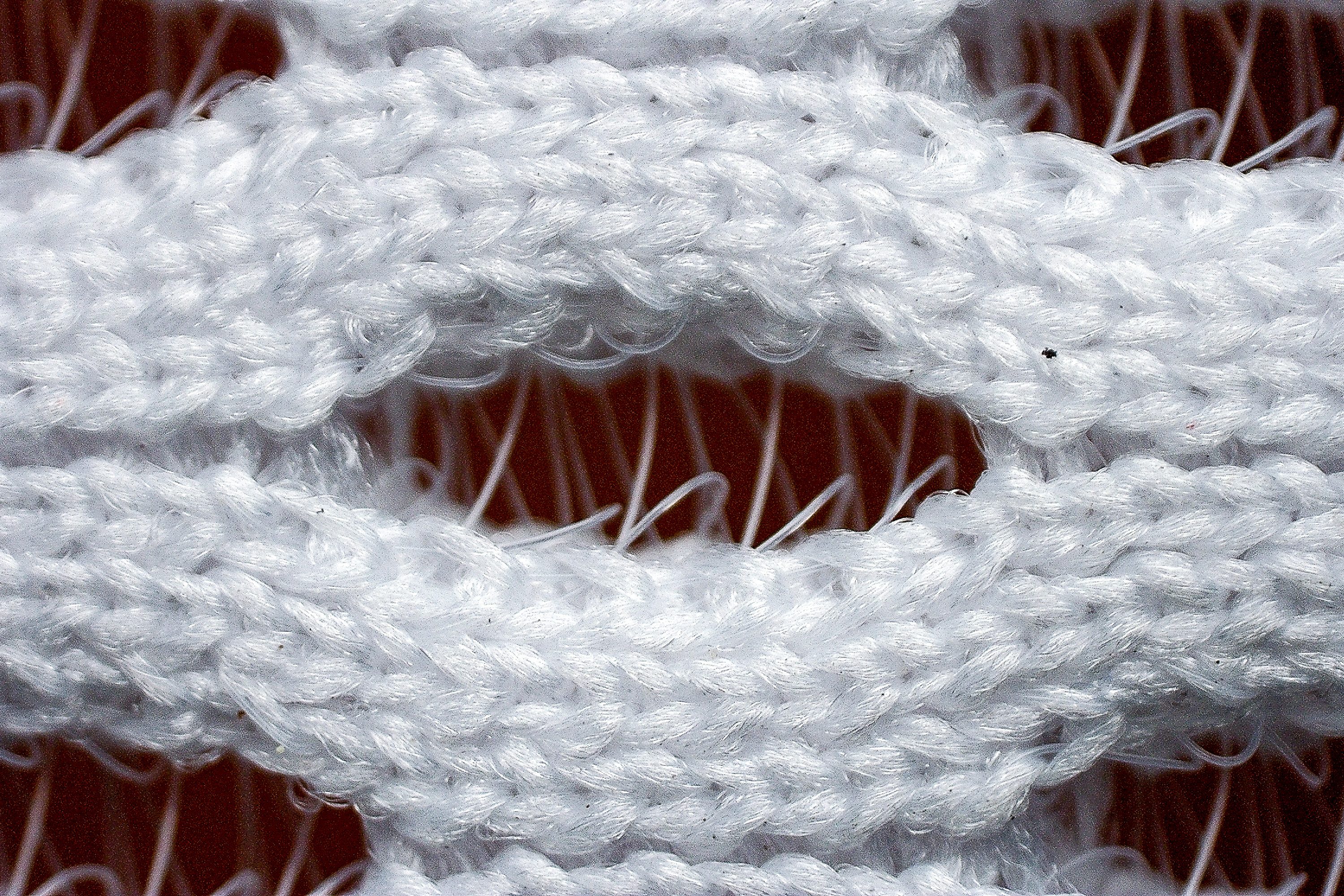
Interestingly, we noticed the upper has a dual-personality design: the front half is thin and race-ready, while the rear section leans toward extra-comfort with generous padding for a plush-and-supportive feel.
| Endorphin Trainer | 5 |
| Average | 3.7 |
Stability
Lateral stability test
With such a towering platform and a cloud-soft foam layer, we expected some instability. However, we discovered that the ultra-firm PWRRUN layer offsets this with extra support, making it a smart pick for runners with moderate stability needs.
Additionally, we were impressed by how the rigid carbon plate adds midfoot and forefoot stability, while the wide base provides a centred, secure ride.
Torsional rigidity
Packing almost 40 mm of foam and a carbon plate, we knew this was destined to be a super-rigid shoe. However, since the plate stops short of the heel, we thought it might get a 4... but nope, it achieved a clear 5/5.
| Endorphin Trainer | 5 |
| Average | 3.5 |
Heel counter stiffness
The heel counter is surprisingly flexible, scoring 2/5. This is quite unusual among super trainers, though we believe Saucony clearly positions this shoe as less ideal for heel strikers—and this adds yet another subtle reason for that.
| Endorphin Trainer | 2 |
| Average | 2.9 |
Midsole width - forefoot
The Endorphin Trainer is massive—there’s simply no other way to describe it. When we unboxed the pair, we were genuinely amazed by its ultra-broad shape, making an average daily trainer look almost like a child’s shoe.
In the forefoot, we measured an impressive 121.7 mm width, which aligns more with a stability shoe. This super-wide platform plays a huge role in the grounded-and-secure feel we discovered while testing this model.
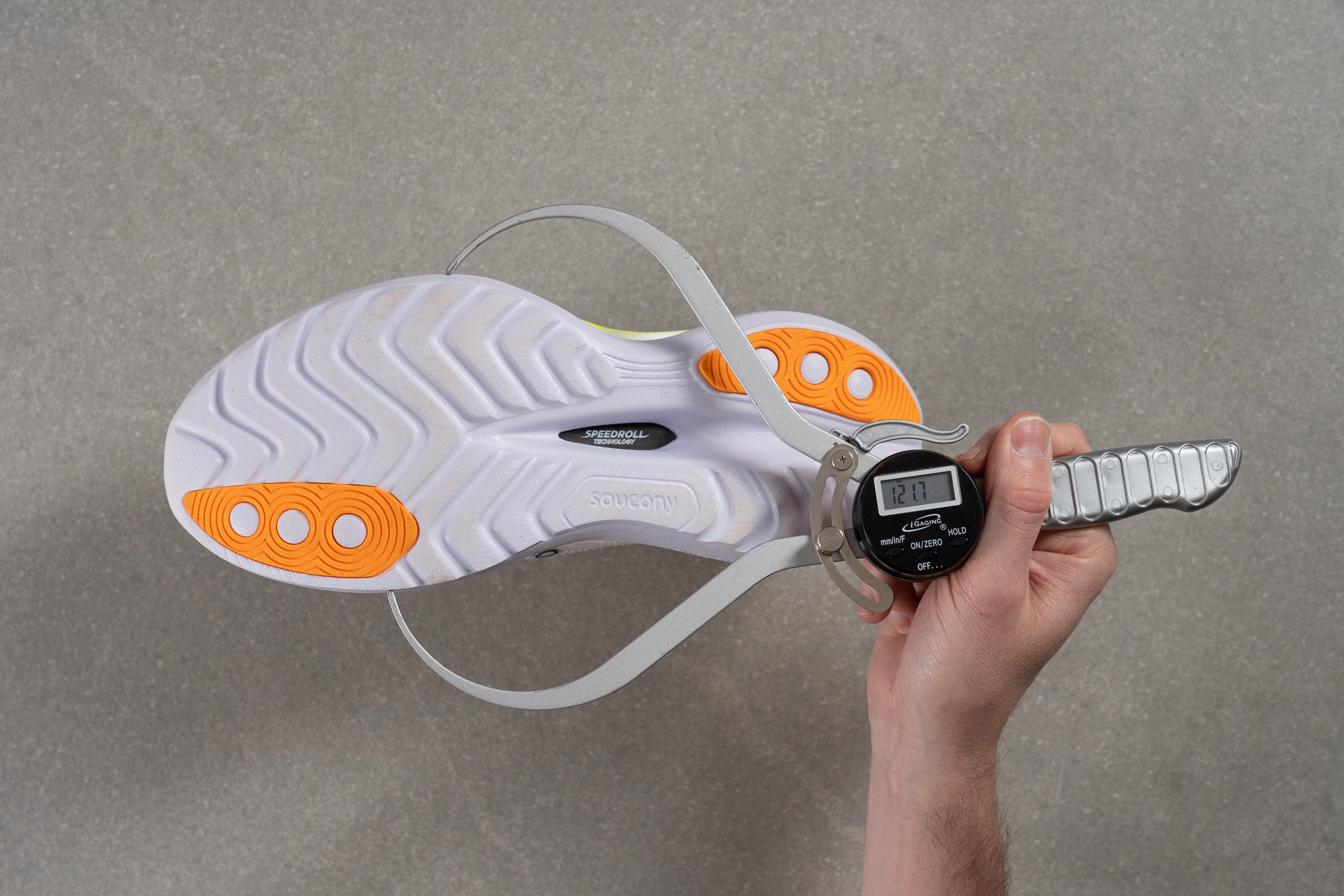
| Endorphin Trainer | 121.7 mm |
| Average | 114.4 mm |
Midsole width - heel
The heel is even more impressive when compared to the average shoe, measuring a remarkable 100.1 mm. It adds extra stability for heel strikers—especially important since the plate stops in the midfoot and the heel counter remains ultra-pliable.
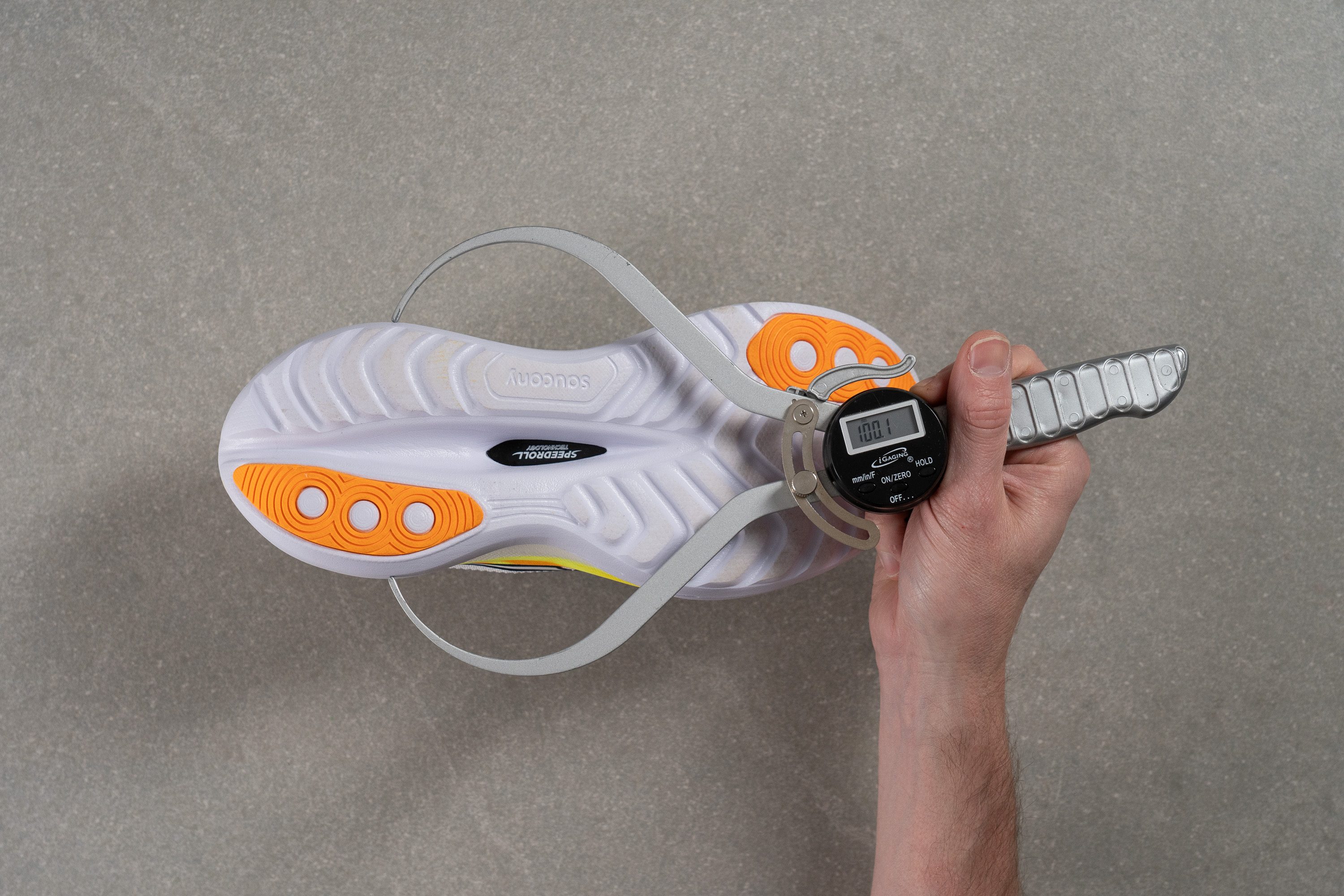
| Endorphin Trainer | 100.1 mm |
| Average | 90.6 mm |
Durability
Toebox durability
We had some concerns about possible durability issues, as the shoe lacks a reinforcement layer below the upper, but after we tested it with our Dremel, the Endorphin Trainer impressed us with a respectable 3/5.
| Endorphin Trainer | 3 |
| Average | 2.6 |
Heel padding durability
We got exactly the 3/5 score in the heel, although here it feels less impressive...
| Endorphin Trainer | 3 |
| Average | 3.4 |
Outsole hardness
We were surprised to find that the Endorphin Trainer features only minimal orange rubber on the outsole, placed solely in the most wear-prone spots, leaving most of the surface exposed to a reinforced PWRRUN layer—raising clear concerns about long-term durability and wet traction here in the lab.

The orange rubber should offer pretty durable protection, and at 81.8 HC, it showcased average hardness. However, we strongly advise sticking to smooth, well-paved roads, as the exposed sections could face rapid wear and tear on rougher terrains.
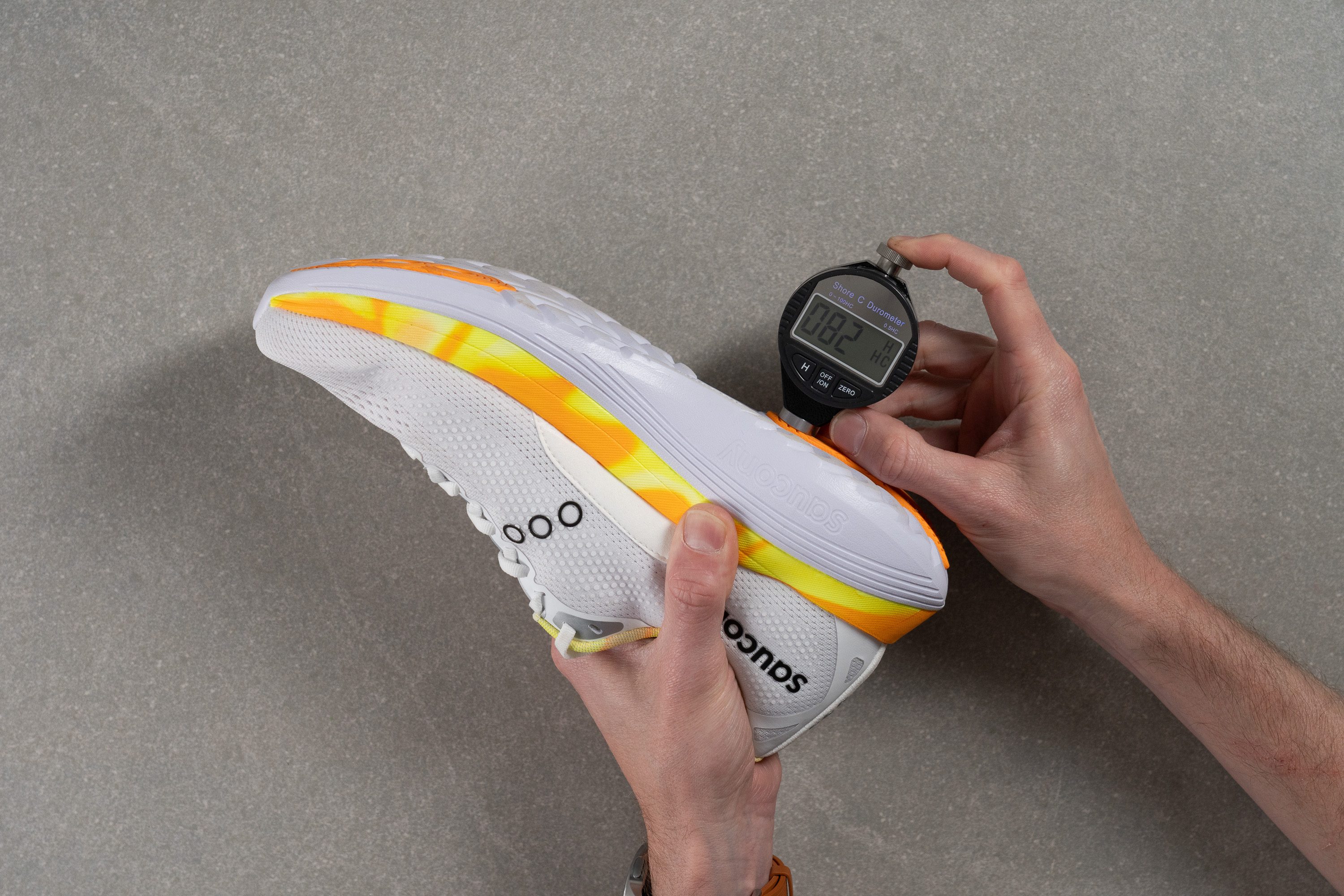
| Endorphin Trainer | 81.8 HC |
| Average | 79.2 HC |
Outsole durability
To check if the orange rubber used by Saucony held well against wear and tear, we tested it with our Dremel for the third time in this review. After the tool finished, we found just 0.7 mm of damage, which is pleasantly impressive!
| Endorphin Trainer | 0.7 mm |
| Average | 1.1 mm |
Outsole thickness
Those two pods of rubber feature 3.1 mm of thickness, which is quite a lot for a performance shoe designed for tempo workouts. We believe Saucony could use a thinner, 1.5 or 2.0 mm rubber instead, covering more outsole and boosting the shoe’s surface versatility.
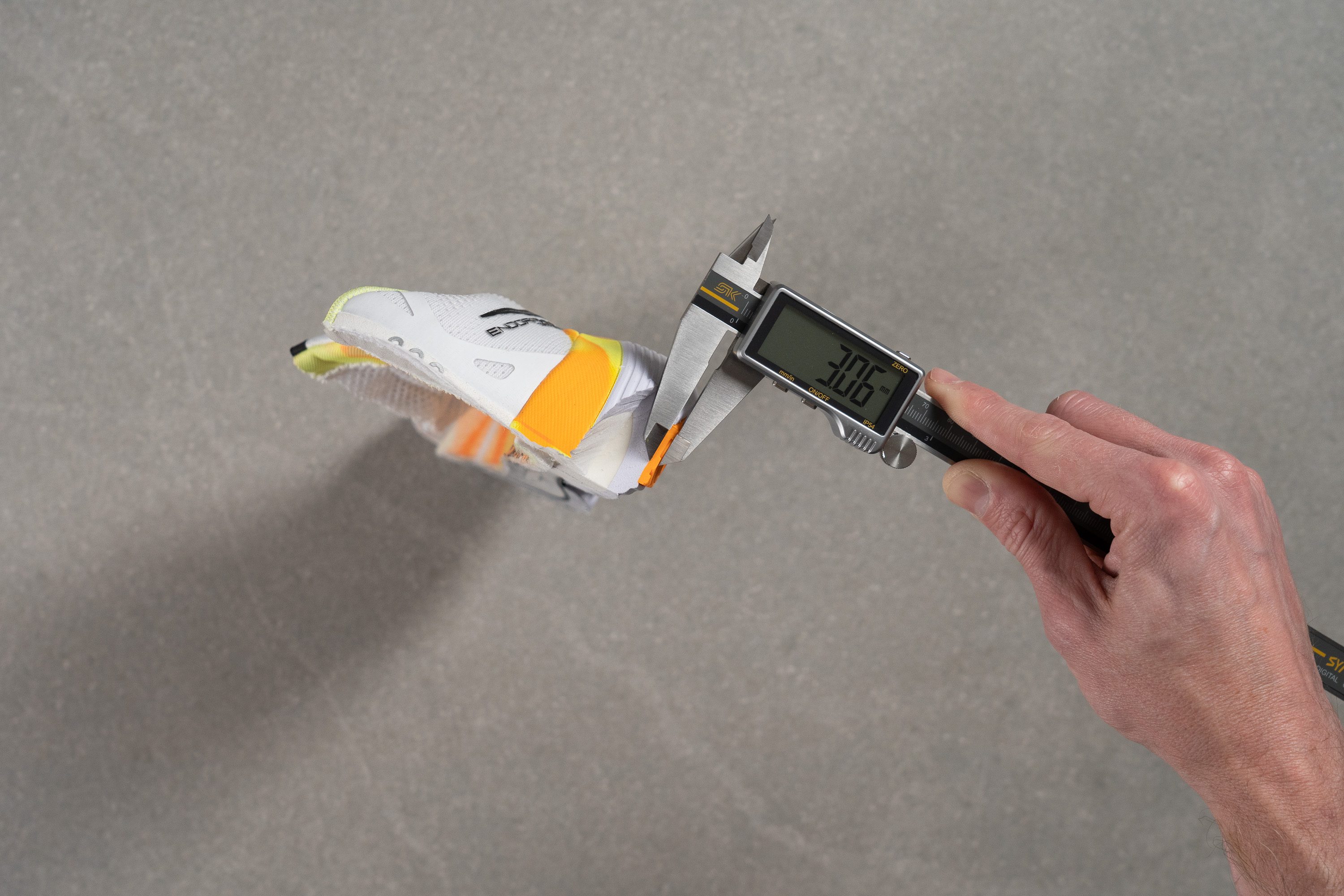
| Endorphin Trainer | 3.1 mm |
| Average | 3.2 mm |
EVA outsole
We were happy to see that the reinforced EVA, despite being much softer than the rubber at 59 HC, delivered a good outcome with only 0.8 mm of damage against our Dremel.
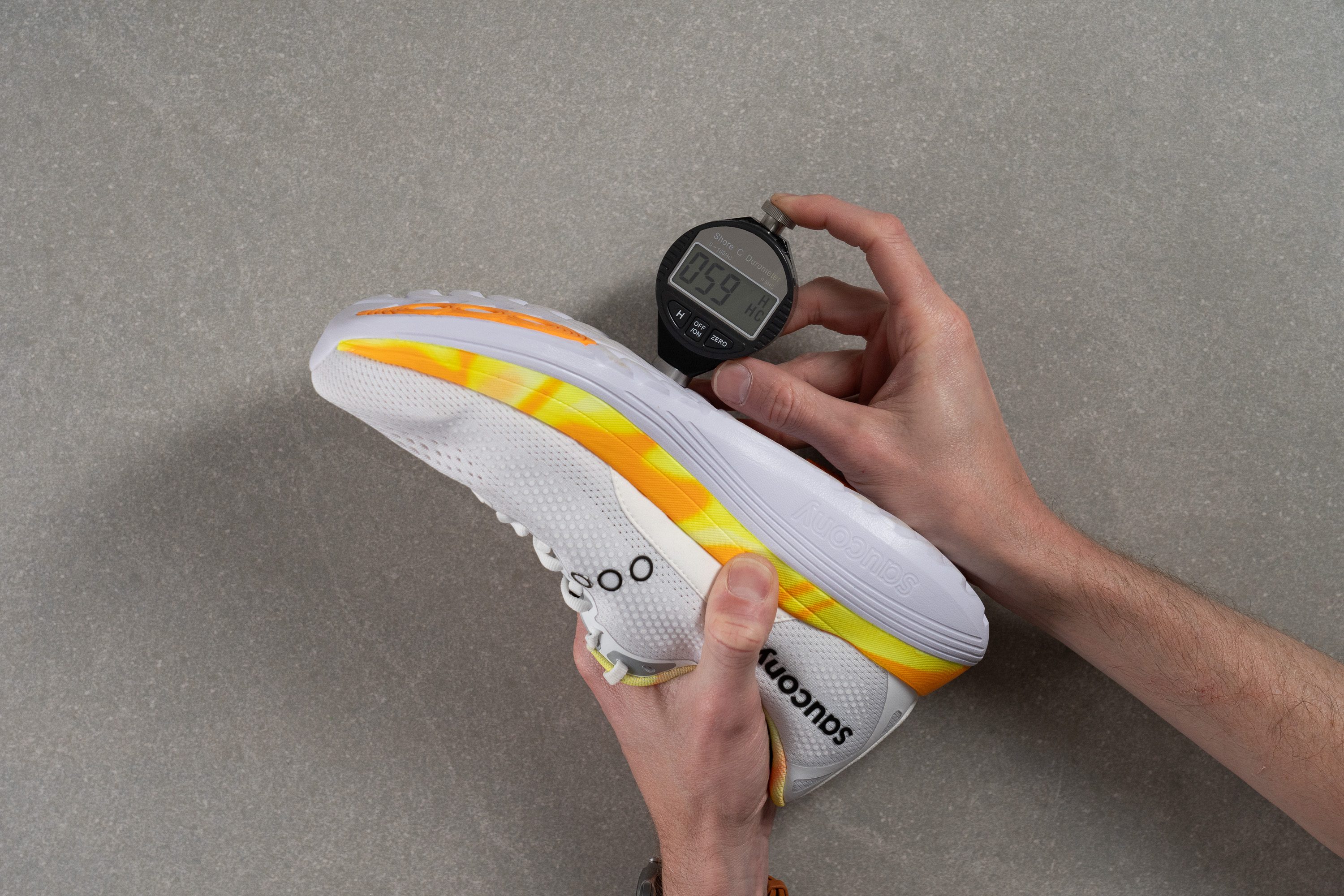
However, it’s important to remember the real issue isn’t regular wear—but running on paths with sharp stones or debris, where ultra-durable works wonders while this EVA material can rip apart quickly.
Misc
Insole thickness
In true Saucony fashion, the insole stands out as something special compared to average offerings. We discovered it’s crafted from PWRRUN+ (TPU) foam, delivering an ultra-plush, bouncy feel thanks to its generous 7.2 mm thickness.
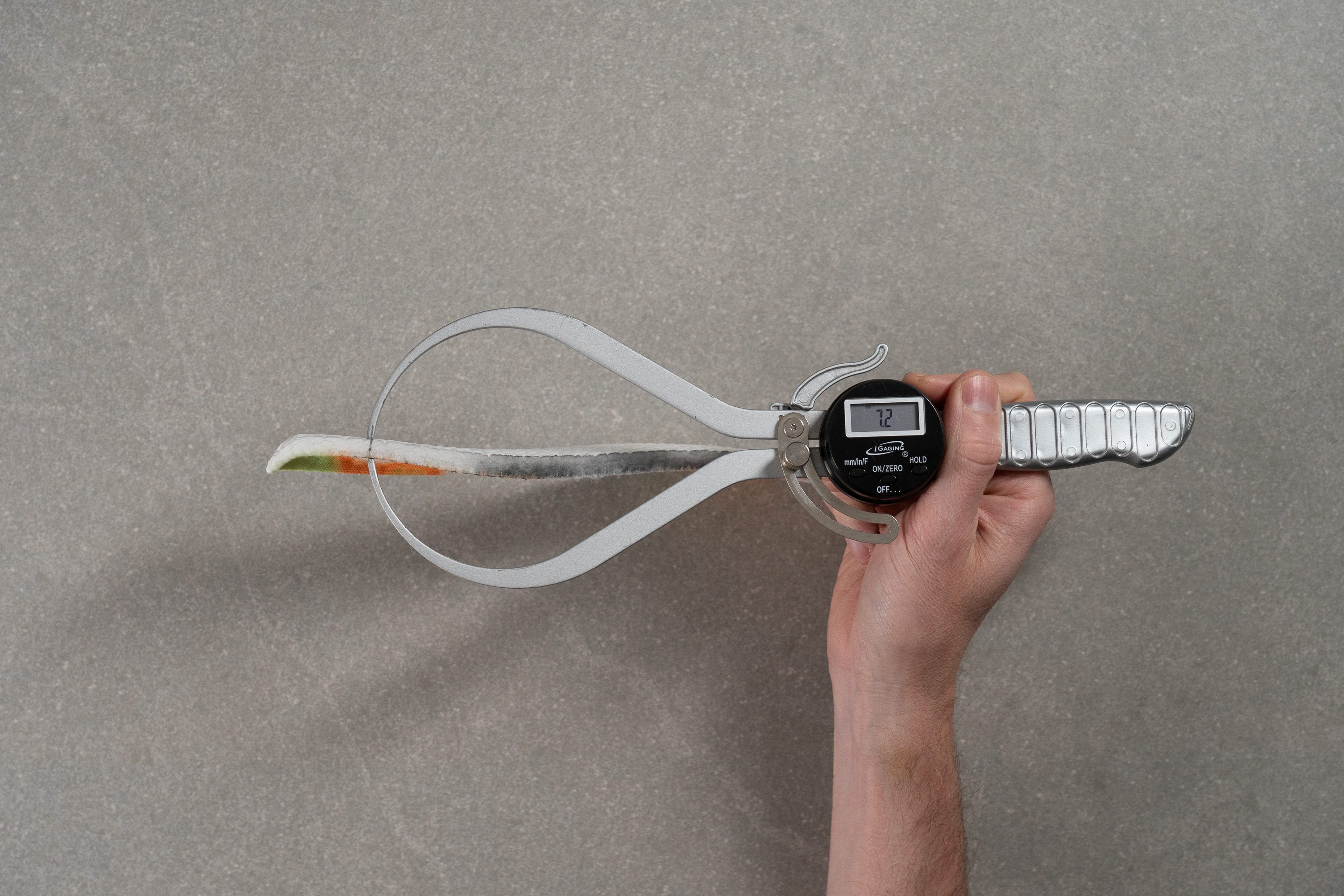
| Endorphin Trainer | 7.2 mm |
| Average | 4.5 mm |
Removable insole
The FormFit insole of the Endorphin Trainer looks ultra-cool, but if you want to remove it, there’s absolutely no problem doing so!
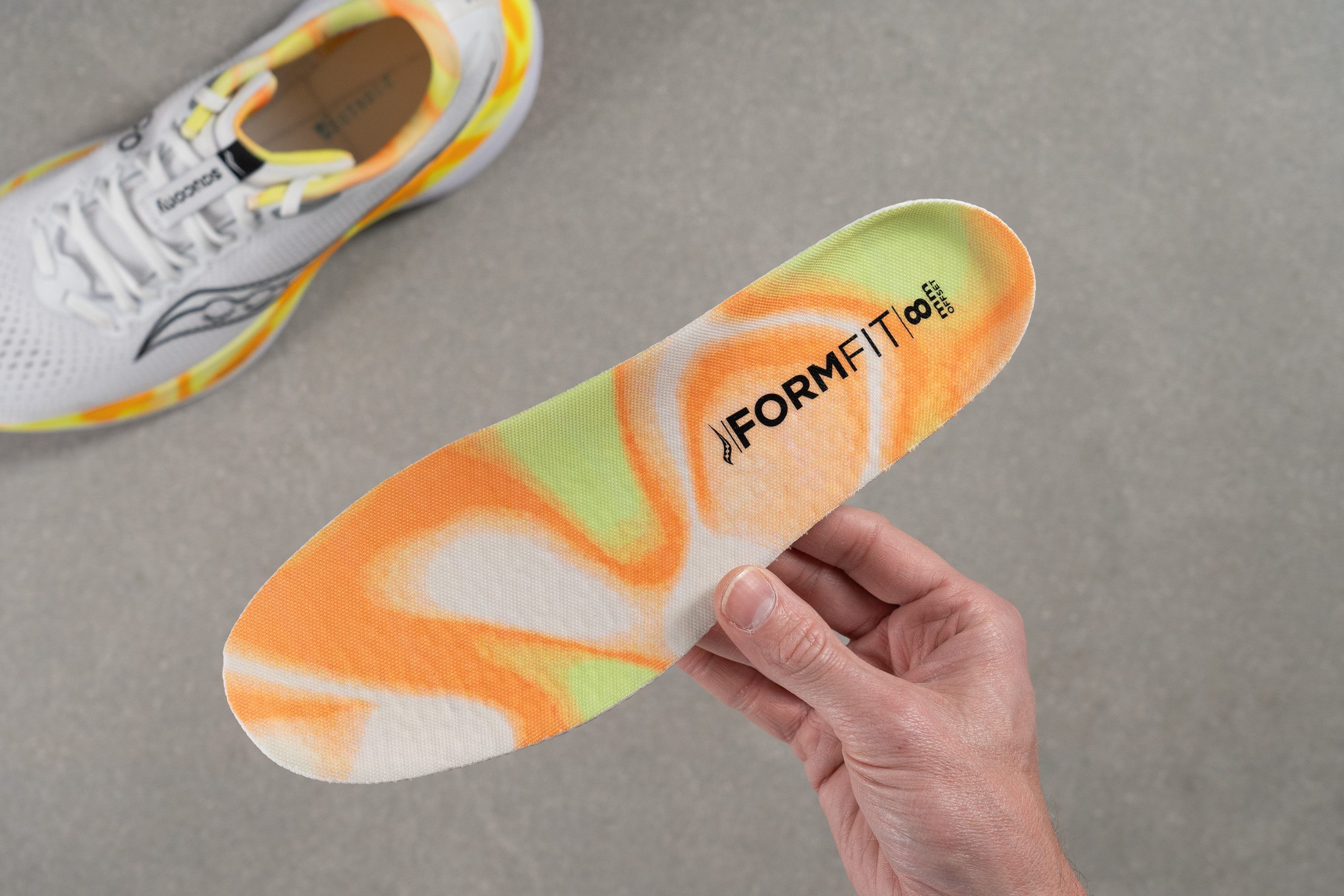
| Endorphin Trainer | Yes |
Midsole softness in cold (%)
Like PEBA, TPEE basically keeps its softness even in cold temperatures. In the Endorphin Trainer, we measured a minor 3% change after 20 minutes in the freezer. That's a super-impressive result!
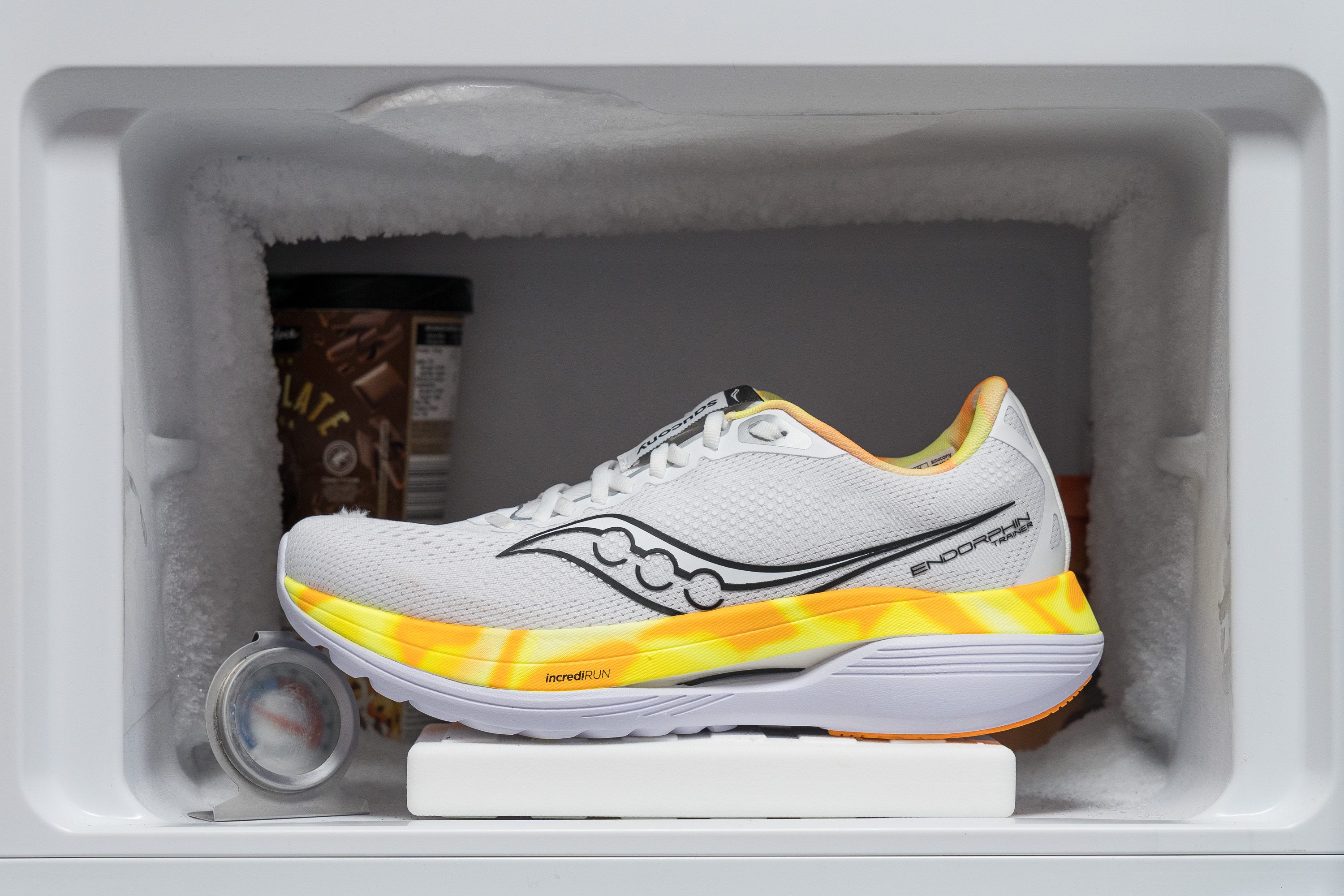
| Endorphin Trainer | 3% |
| Average | 24% |
Reflective elements
As seen in many of their other models, Saucony added three small, reflective circles to the back of the shoe for extra nighttime visibility.
| Endorphin Trainer | Yes |
Tongue padding
One of the usual traits of super trainers is you get some of the performance from a super shoe combined with the comfortable feel of a daily trainer. And the tongue definitely leans toward the latter category.
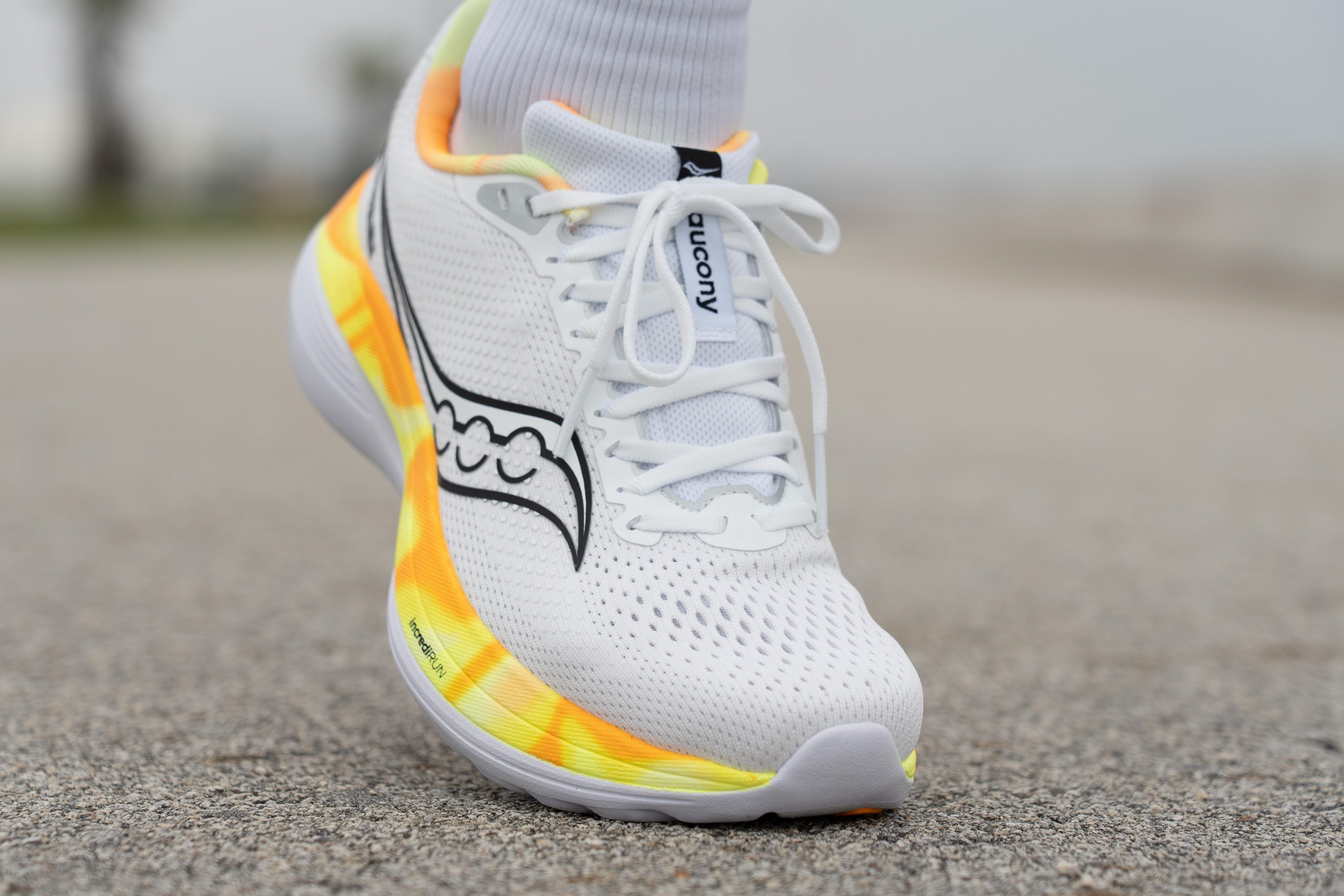
In fact, we discovered it feels almost identical to what we tested on the Saucony Ride 18, although this one is slightly thinner at 6.5 mm, yet still comfortable for long runs. We also found zero issues with the ultra-secure laces and the durable eyelet chain, which uses punched holes and includes an extra one for a runner's knot.
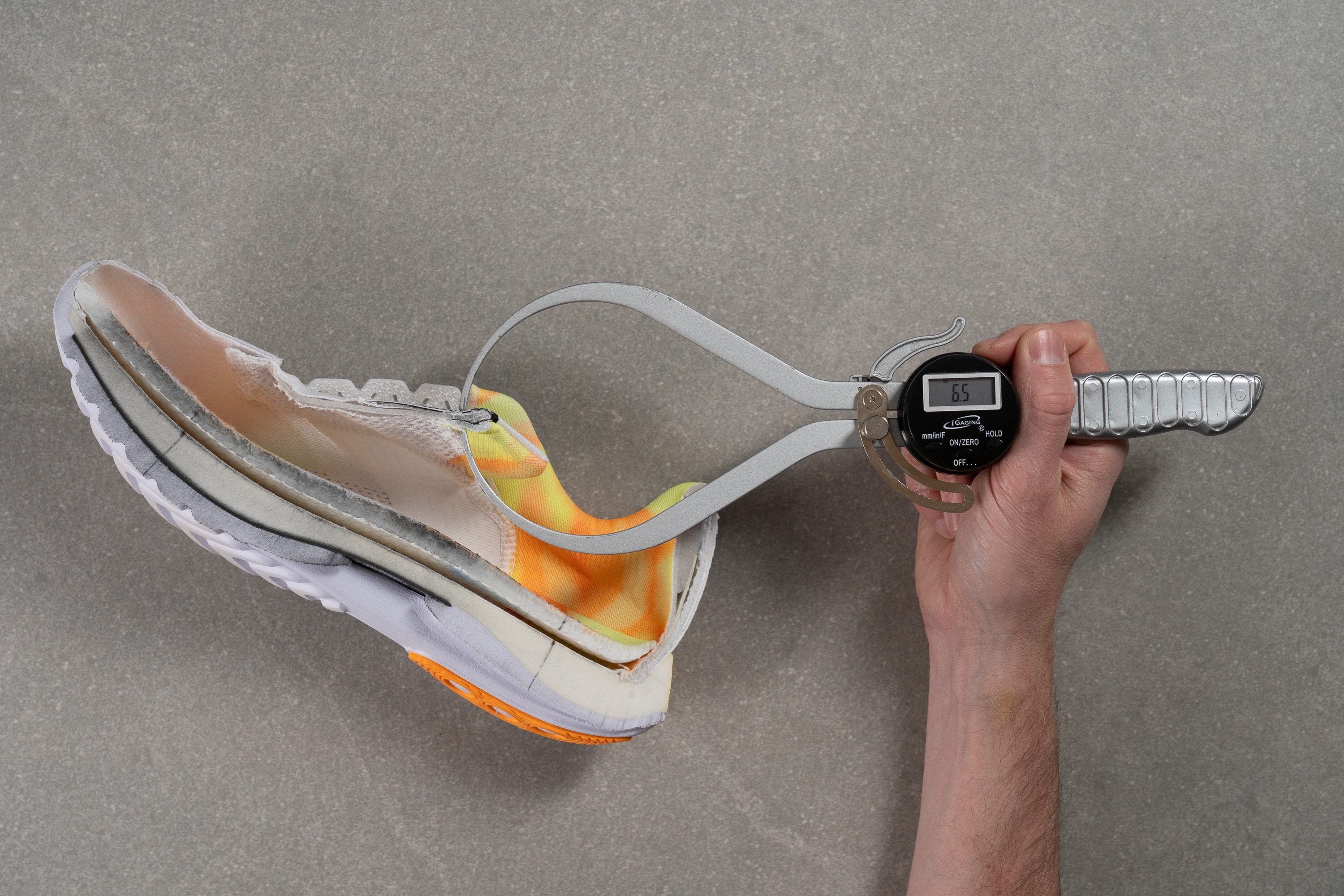
| Endorphin Trainer | 6.5 mm |
| Average | 5.7 mm |
Tongue: gusset type
We found that Saucony added a partial gusset to the tongue, and it feels fantastic for a tempo-focused shoe—it’s non-intrusive, feather-light, and holds the tongue perfectly in place without any annoying shifts.
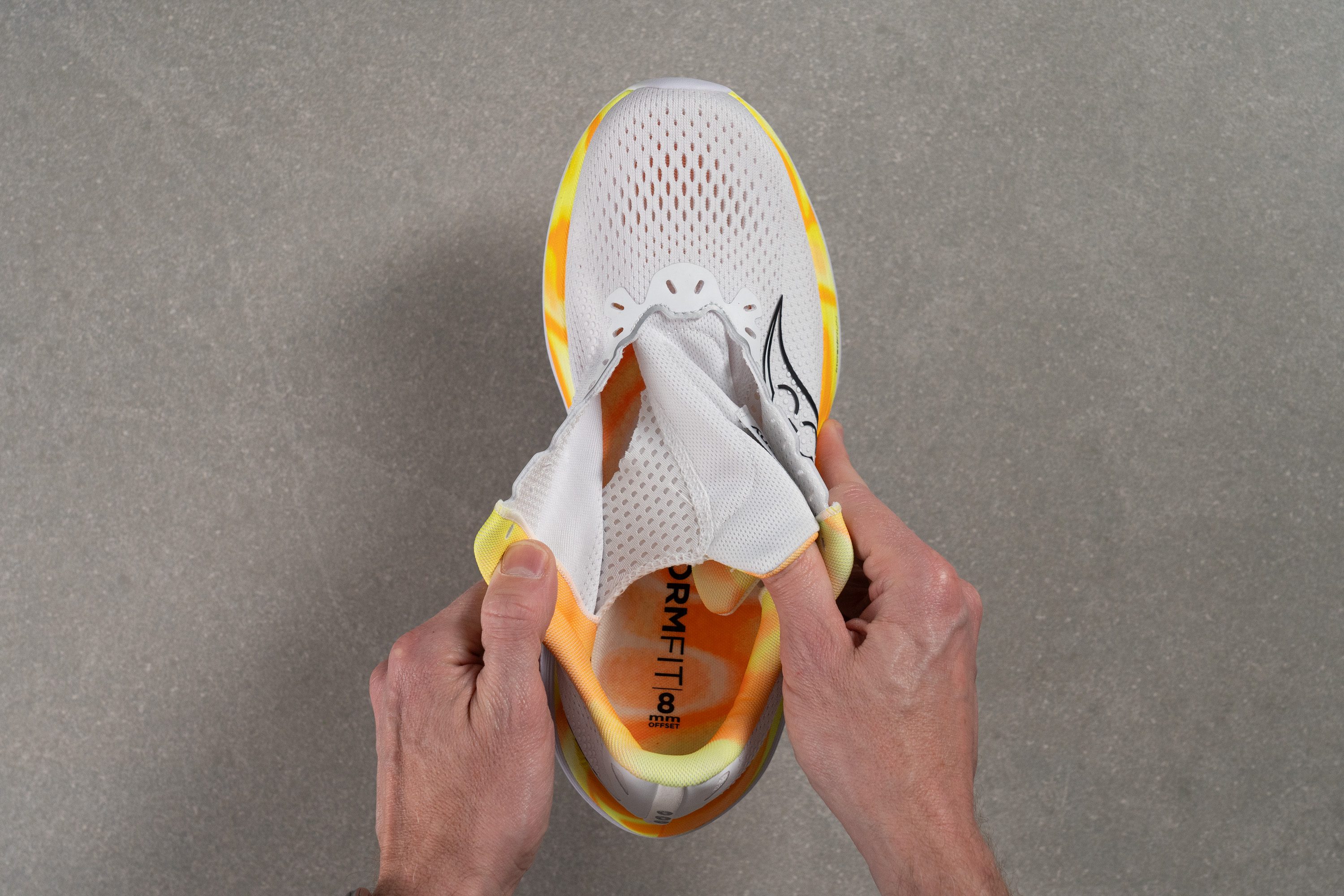
| Endorphin Trainer | Both sides (semi) |
Heel tab
Saucony went with a sleek, minimal design, skipping a heel tab and using some TPU overlays to cover the stitching, giving the shoe a polished, premium finish.
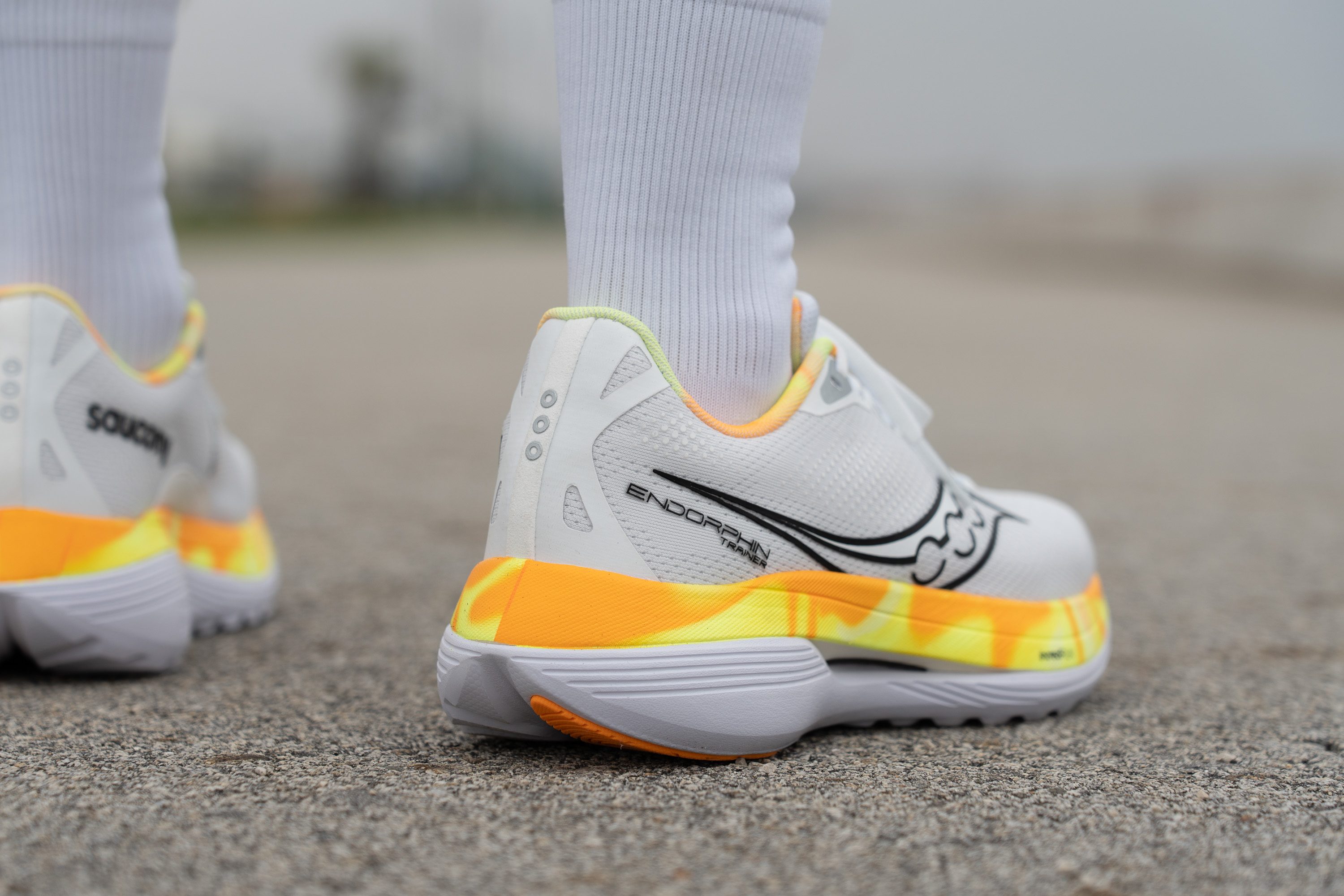
| Endorphin Trainer | None |
Price
The super trainer market is boiling like lava with fierce competition among brands. The Endorphin Trainer is priced right alongside most rivals—neither discounted nor premium—and it feels exactly that way against the competition, landing squarely in the middle of the pack.
| Endorphin Trainer | $180 |

